#99names
Text
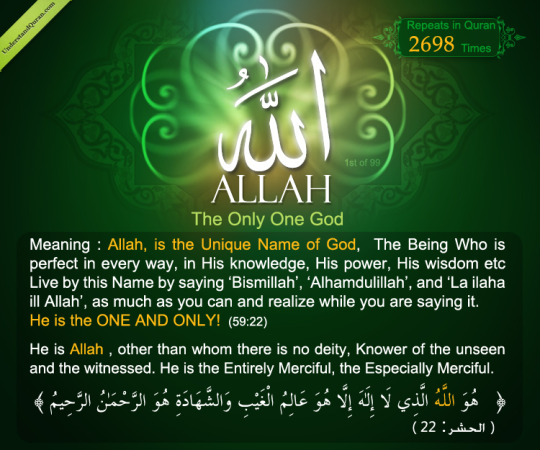



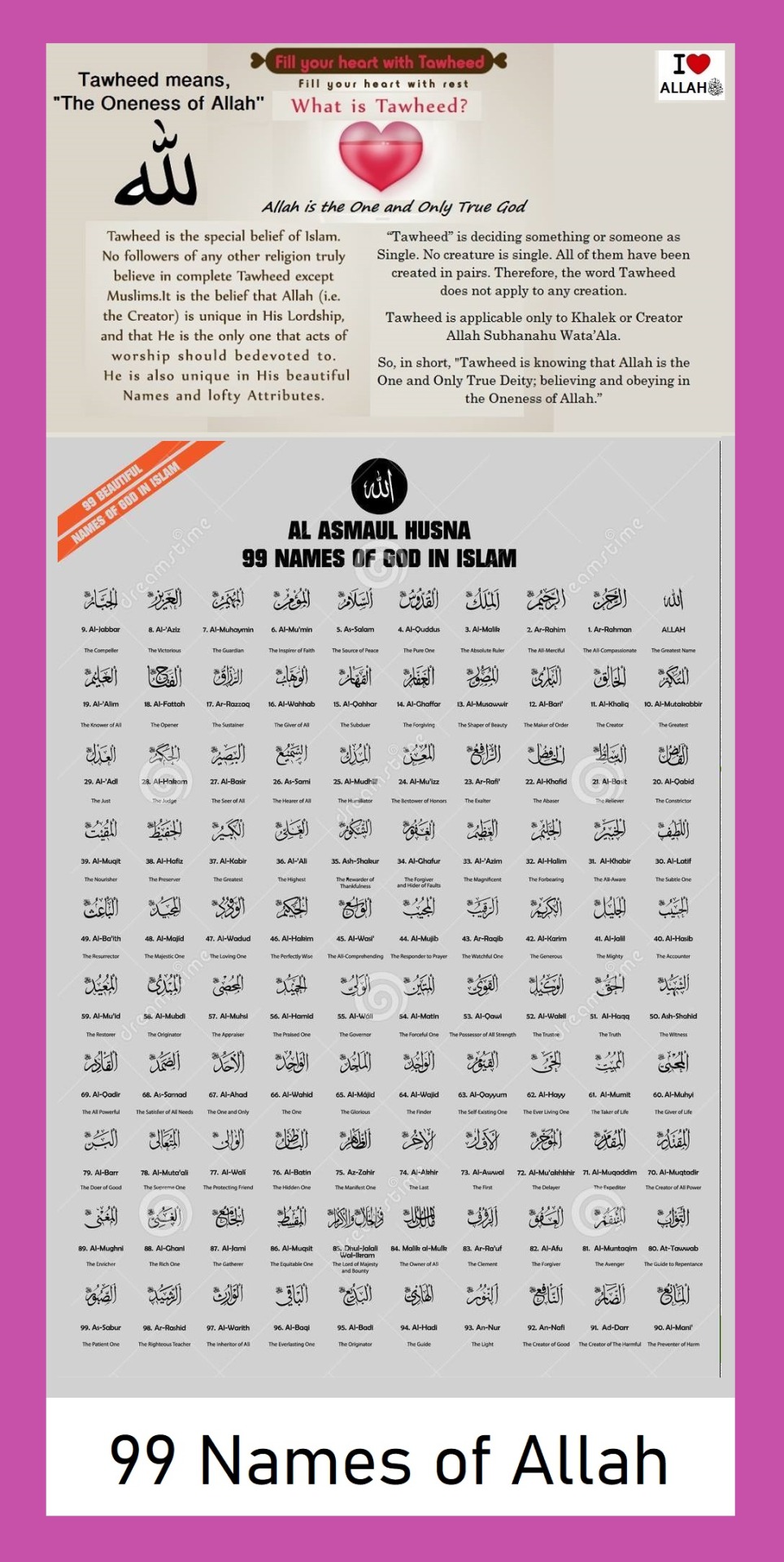

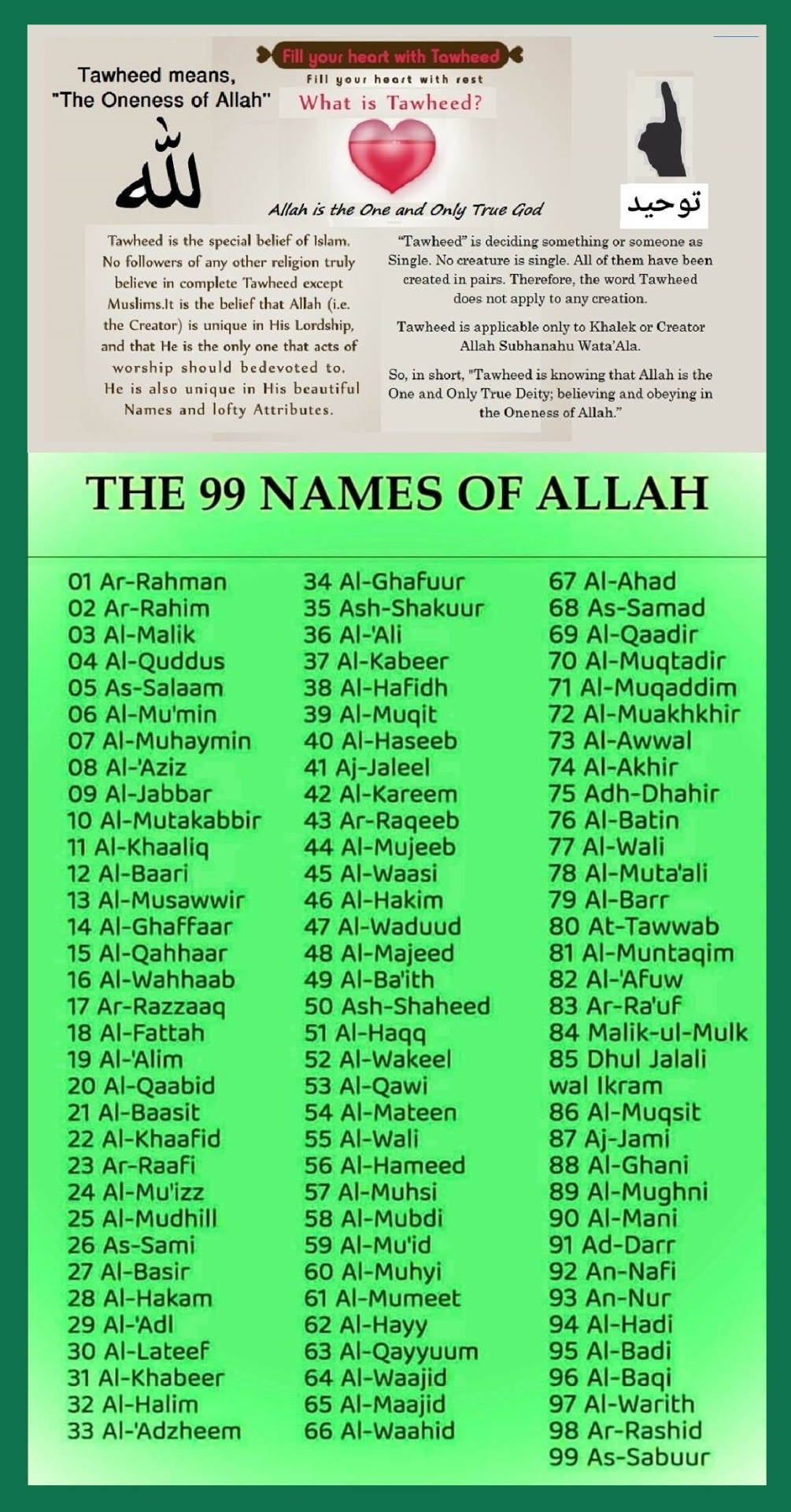
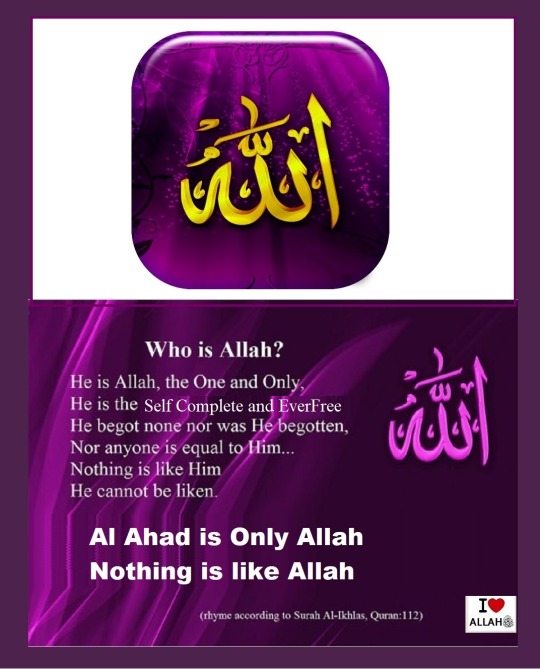
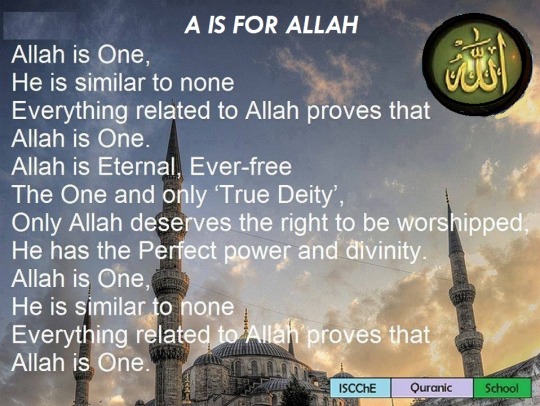
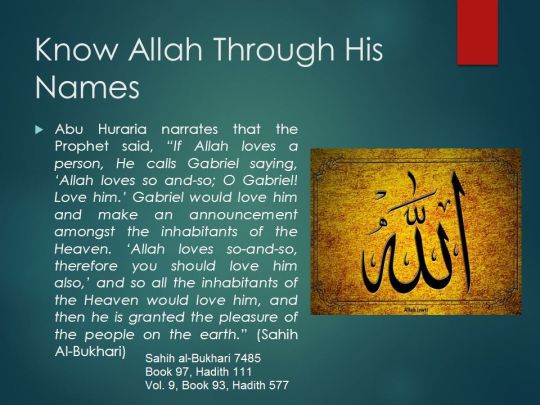
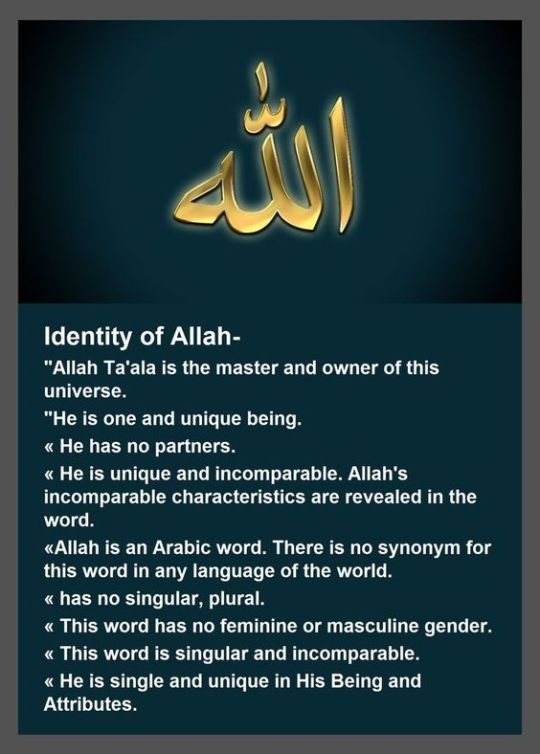

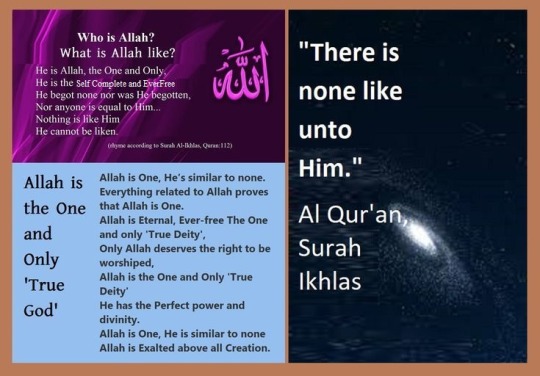
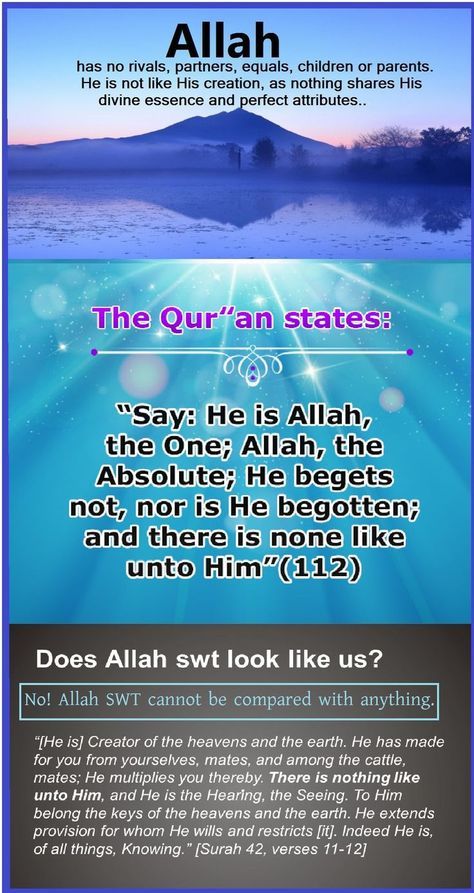
Benefits of Memorizing 99 Names of Allah
In the beautiful journey of Islamic spirituality, memorizing the 99 Names of Allah is like finding a special key that connects believers with the Creator. Memorizing the 99 Names of Allah has unique qualities representing divine attributes, that foster a deep spiritual connection with Allah.
The benefits of reciting Allah’s names include empowering you to face life’s challenges, build personal transformation, and cultivate inner peace.
10 Benefits of Learning 99 Names of Allah
10 Benefits of Learning 99 Names of Allah
1. Create a Spiritual Connection and Bonding with Allah
2. Memorizing Asma Ul Husna builds Personal Transformation
3. Learning Asmaul Husna Create Inner Peace
4. Empower you to Face Life’s Challenges
5. Increased Gratitude and Increased Compassion
6. Reciting Allah’s Names Provides Healing from Diseases
7. Asma Ul Husna Improved Decision-Making
8. Stress Relief and Resolve Psychological Issues
9. Boost your Self-esteem and Self-worth
10. Acceptance in Duas and Paradise’s Reward
1. Create a Spiritual Connection and Bonding with Allah
Learn how to pray with 99 names of Allah to enhance your spiritual connection and deepen your prayer experience. Memorizing the 99 Names of Allah is a powerful practice that creates a deep spiritual connection and bonding with the Almighty.
“And (all) the Most Beautiful Names belong to Allah, so call on Him by them.”
When you memorize Allah names, you engage in a profound dialogue with Allah, addressing Him with specific attributes that resonate with your spiritual journey. So, this practice enhances the quality of your prayers, making them more personal and heartfelt.
2. Memorizing Asma Ul Husna builds Personal Transformation
Memorizing and learning the meaning of Allah’s names plays an essential role in personal transformation. Therefore, these names help shape favourable character traits. The following are some personal changes related to memorizing these names:
Mercy and Compassion: Ar-Rahman (the Most Merciful) and Ar-Rahim (the Most Compassionate) inspire compassion. Memorizing these names promotes daily mercy and compassion.
Patient and Perseverance: As-Sabur (the Patient) and Al-Aziz (the Mighty) inspire patience and perseverance. Besides, this strengthens people via adversity.
Justice and Fairness: Al-Adl (the Just) and Al-Hakam (the Judge) promote justice and fairness in relationships. Also, this encourages morality and responsibility.
Wisdom and Knowledge: Al-Hakim (the Wise) and Al-Alim (the All-Knowing) inspire wisdom and knowledge. Furthermore, memorizing these names helps comprehension and informed decision-making.
Humility and Graciousness: Al-Mutakabbir (the Majestic) and Al-Karim (the Generous) encourage humility and graciousness. People with these traits improve their communities and relationships.
3. Learning Asmaul Husna Create Inner Peace
Memorizing Allah’s 99 Names brings inner tranquility during life’s turmoil. Remembering Asma’u Allah Alhusna relaxes, according to Surah Taha (20:8): “Allah—there is no god ˹worthy of worship˺ except Him. He has the Most Beautiful Names.”
Source of Comfort and Stress Relief
Ar-Rahman (the Most Merciful) and As-Salam (the Source of tranquillity) symbolize Allah’s infinite kindness and ultimate tranquillity. Moreover, this insight comforts you during difficult times.
Reciting these names relieves tension. In addition, it helps people cope with stress by focusing on Allah’s peace. Further, names like Al-Latif (the Subtle) and Al-Basir (the All-Seeing) let you understand Allah’s watchful presence.
4. Empower you to Face Life’s Challenges
Memorizing Allah’s 99 Names gives people courage and resilience to overcome life’s hardships. Recognition of Allah’s counsel and support underpins this empowerment.
Al-Qawi (the Strong) and Al-Matin (the Firm) inspire inner strength to overcome adversity. So, this awareness of supernatural strength boosts confidence in facing life’s obstacles. Moreover, Al-Hadi and Al-Hakim provide guidance.
In addition, memorizing names like Al-Wakil (the Trustee) builds faith in Allah’s plan. Furthermore, recognizing Allah as Al-Mujib (the Responsive) gives strength since prayers are heard and answered. Knowing Allah is responsive empowers people to persevere.
5. Increased Gratitude and Increased Compassion
Memorizing the 99 Names of Allah increases thankfulness and compassion, improving self- and other-image.
Ar-Razzaq (the Provider) evokes thanks for life’s plentiful benefits, inspiring thankfulness. Which name of Allah to recite for wealth? One of the names of Allah associated with wealth and sustenance is “Ar-Razzaq.
Which name of Allah to recite for help? One of the names of Allah that are often recited for seeking help is “Ya Mujeeb,” which translates to “O Responsive One”.
Furthermore, honouring the Most Merciful and Most Compassionate promotes self-compassion and healthy relationships. The name Al-Karim (the Generous) inspires people to help others.
6. Reciting Allah’s Names Provides Healing from Diseases
Reciting Allah’s Names might bring comfort and relief.
Spirit Healing: Reciting Allah’s names is said to calm and console those suffering physically or emotionally.
Emotional Well-being: Allah’s name may improve mental health and inner tranquillity.
Reciting the name Al-Shafi (the Healer) is believed to bring healing and protection.
7. Asma Ul Husna Improved Decision-Making
Memorizing the Asma Ul Husna helps people make divinely guided decisions. Get guidance from Al-Hakim. Al-Hakim (the Wise) encourages wise decision-making.
Recognition of Allah as Al-Alim (the All-Knowing) allows people to make informed decisions. Besides, it is because they rely on Allah’s wisdom that transcends human limitations.
8. Stress Relief and Resolve Psychological Issues
Memorizing the 99 Names of Allah reduces stress and resolves psychological disorders. Therefore, reciting these names relaxes the mind and heart during life’s trials. According to Surah Ar-Ra’d (13:28),
“those who believe and whose hearts find comfort in the remembrance of Allah. Surely in the remembrance of Allah do hearts find comfort.”
Reciting the Names of Allah may reduce tension, anxiety, and depression. Moreover, meditation on these celestial names shifts focus from negative emotions to calm and connection with the celestial.
9. Boost your Self-esteem and Self-worth
Memorizing the Asma Ul Husna boosts self-esteem and self-worth.
Recognition of Allah’s Creation
Knowing that Allah, as Al-Khaliq, created people with care and purpose boosts self-esteem. Recognizing that everyone is unique boosts self-esteem.
10. Acceptance in Duas and Paradise’s Reward
Remembering Allah’s 99 Names helps accept duas and promises of reward in heaven. Memorize 99 names of Allah hadith in Sahih al-Bukhari 7392, and Sahih Muslim 2677. Abu Huraira reported: The Prophet, PBUH, said,
“Allah has ninety-nine Names, one-hundred less one; and he who memorized them all by heart will enter Paradise.”
youtube
youtube
youtube
youtube
youtube
youtube
Allah is unique, almighty, the only Deity.
#allahswt#allah'snature#tawheed#whoisallah#99namesofallah#asmaalhusna#allahmeanings#tawhid#ALLAH#ALLAHSWT#ALLAHMeanings#WhoisAllah#Asmawassifat#Asmaalhusna#99NamesofAllah#99Names#Allah'sNature#Allah'sNames#Allah'sAttrributes#Allah'sQualities#Allah'sDefinition#TrueGod#TrueDeity#Allah#God#Deity#Ilah#Lord#LaIlahaIllaAllah#WhoIsAllah
0 notes
Text
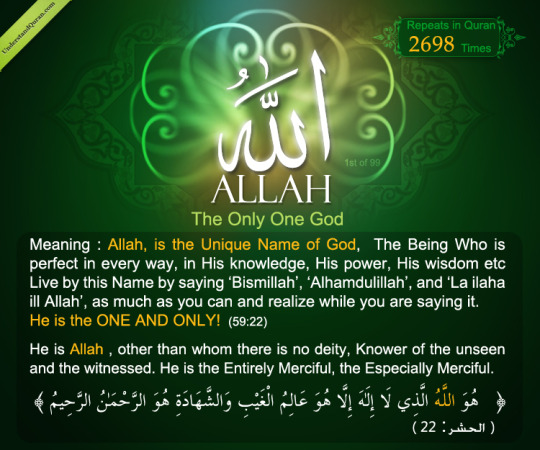



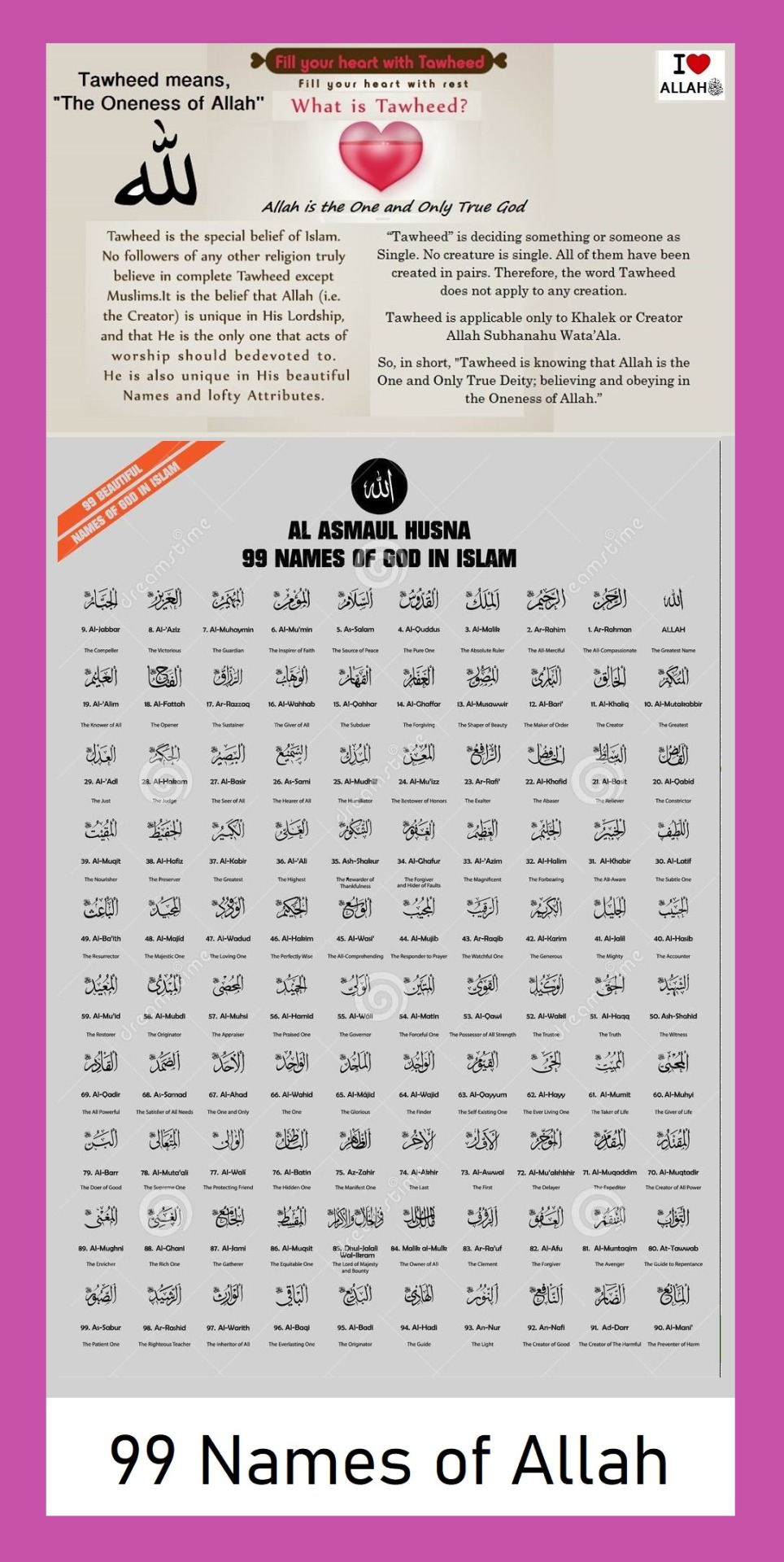

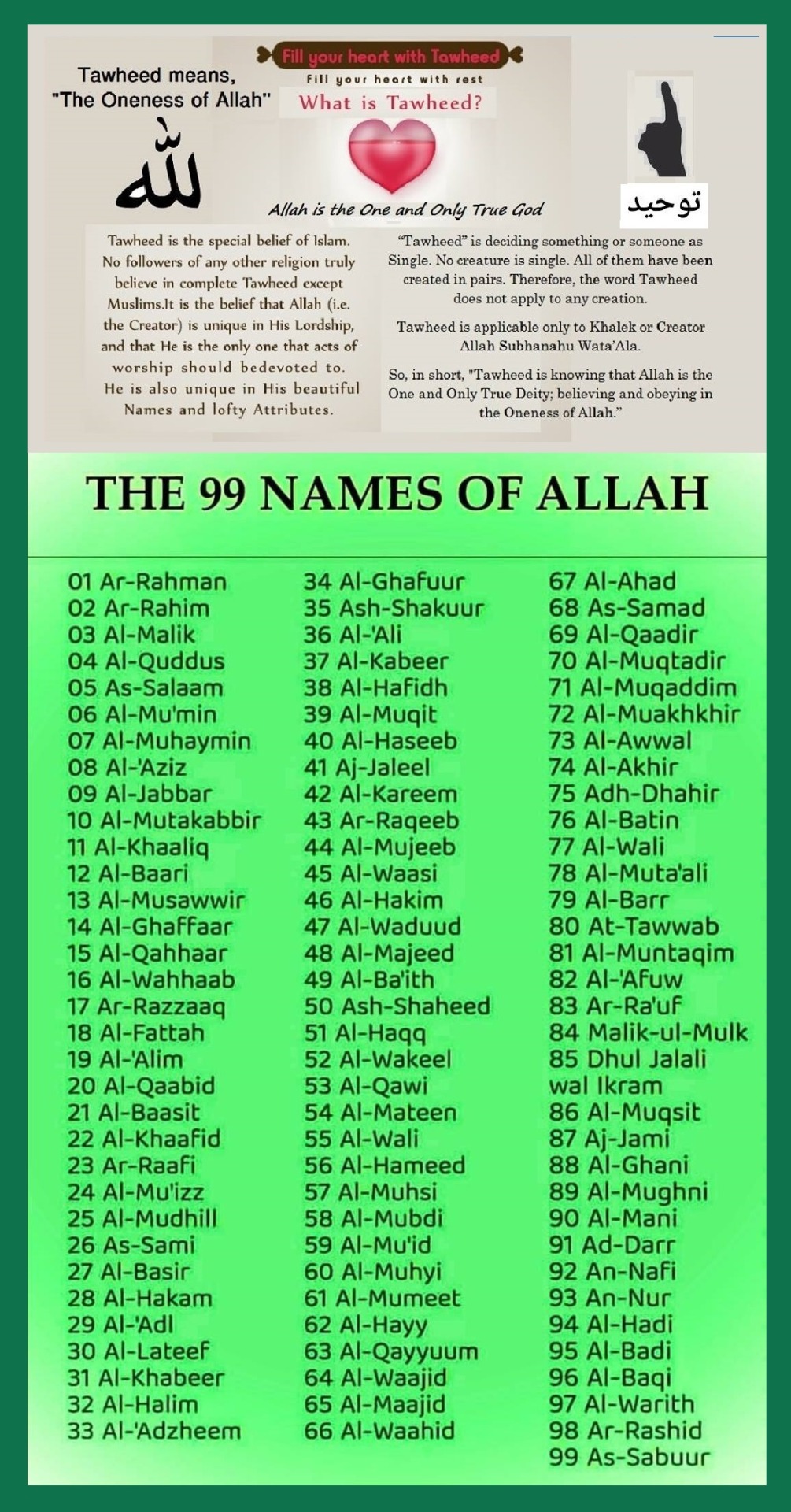
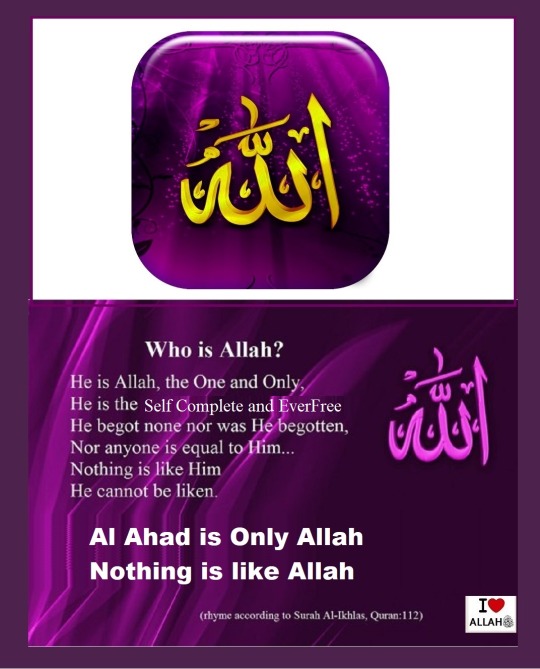
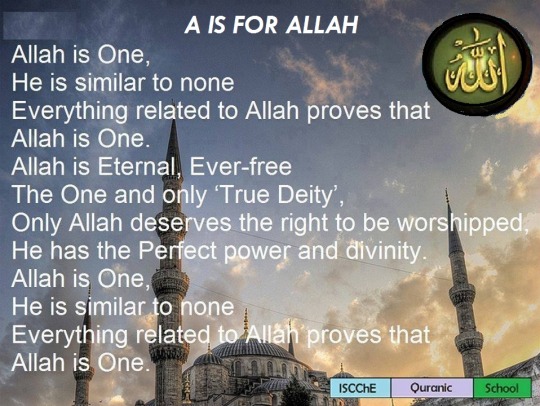
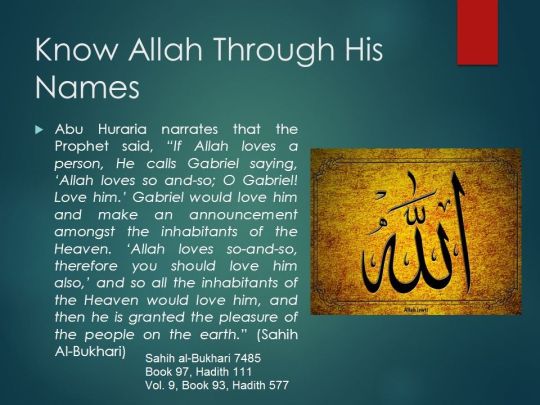
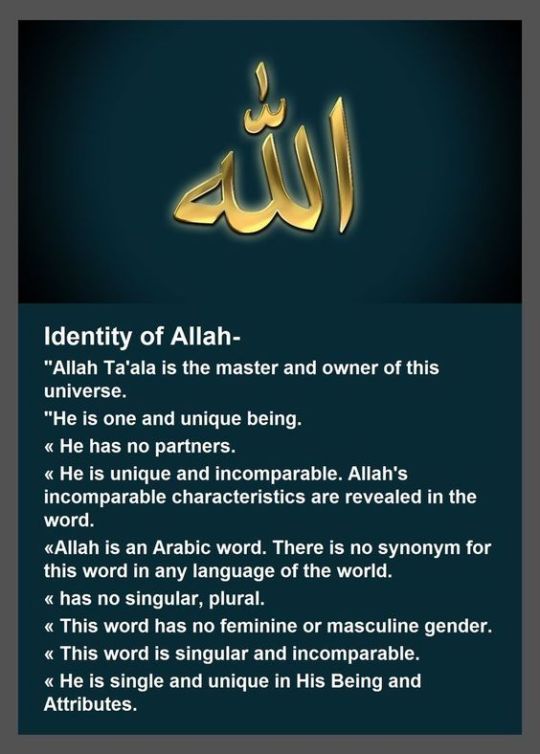

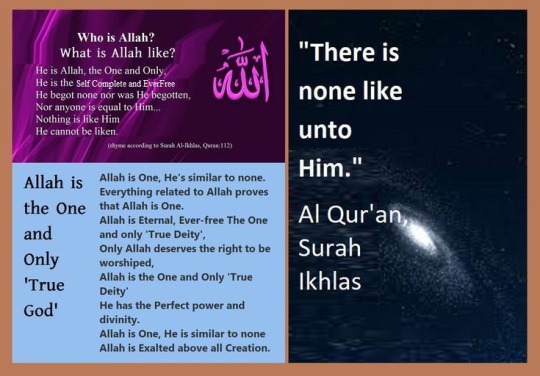

Benefits of Memorizing 99 Names of Allah
In the beautiful journey of Islamic spirituality, memorizing the 99 Names of Allah is like finding a special key that connects believers with the Creator. Memorizing the 99 Names of Allah has unique qualities representing divine attributes, that foster a deep spiritual connection with Allah.
The benefits of reciting Allah’s names include empowering you to face life’s challenges, build personal transformation, and cultivate inner peace.
10 Benefits of Learning 99 Names of Allah
10 Benefits of Learning 99 Names of Allah
1. Create a Spiritual Connection and Bonding with Allah
2. Memorizing Asma Ul Husna builds Personal Transformation
3. Learning Asmaul Husna Create Inner Peace
4. Empower you to Face Life’s Challenges
5. Increased Gratitude and Increased Compassion
6. Reciting Allah’s Names Provides Healing from Diseases
7. Asma Ul Husna Improved Decision-Making
8. Stress Relief and Resolve Psychological Issues
9. Boost your Self-esteem and Self-worth
10. Acceptance in Duas and Paradise’s Reward
1. Create a Spiritual Connection and Bonding with Allah
Learn how to pray with 99 names of Allah to enhance your spiritual connection and deepen your prayer experience. Memorizing the 99 Names of Allah is a powerful practice that creates a deep spiritual connection and bonding with the Almighty.
“And (all) the Most Beautiful Names belong to Allah, so call on Him by them.”
When you memorize Allah names, you engage in a profound dialogue with Allah, addressing Him with specific attributes that resonate with your spiritual journey. So, this practice enhances the quality of your prayers, making them more personal and heartfelt.
2. Memorizing Asma Ul Husna builds Personal Transformation
Memorizing and learning the meaning of Allah’s names plays an essential role in personal transformation. Therefore, these names help shape favourable character traits. The following are some personal changes related to memorizing these names:
Mercy and Compassion: Ar-Rahman (the Most Merciful) and Ar-Rahim (the Most Compassionate) inspire compassion. Memorizing these names promotes daily mercy and compassion.
Patient and Perseverance: As-Sabur (the Patient) and Al-Aziz (the Mighty) inspire patience and perseverance. Besides, this strengthens people via adversity.
Justice and Fairness: Al-Adl (the Just) and Al-Hakam (the Judge) promote justice and fairness in relationships. Also, this encourages morality and responsibility.
Wisdom and Knowledge: Al-Hakim (the Wise) and Al-Alim (the All-Knowing) inspire wisdom and knowledge. Furthermore, memorizing these names helps comprehension and informed decision-making.
Humility and Graciousness: Al-Mutakabbir (the Majestic) and Al-Karim (the Generous) encourage humility and graciousness. People with these traits improve their communities and relationships.
3. Learning Asmaul Husna Create Inner Peace
Memorizing Allah’s 99 Names brings inner tranquility during life’s turmoil. Remembering Asma’u Allah Alhusna relaxes, according to Surah Taha (20:8): “Allah—there is no god ˹worthy of worship˺ except Him. He has the Most Beautiful Names.”
Source of Comfort and Stress Relief
Ar-Rahman (the Most Merciful) and As-Salam (the Source of tranquillity) symbolize Allah’s infinite kindness and ultimate tranquillity. Moreover, this insight comforts you during difficult times.
Reciting these names relieves tension. In addition, it helps people cope with stress by focusing on Allah’s peace. Further, names like Al-Latif (the Subtle) and Al-Basir (the All-Seeing) let you understand Allah’s watchful presence.
4. Empower you to Face Life’s Challenges
Memorizing Allah’s 99 Names gives people courage and resilience to overcome life’s hardships. Recognition of Allah’s counsel and support underpins this empowerment.
Al-Qawi (the Strong) and Al-Matin (the Firm) inspire inner strength to overcome adversity. So, this awareness of supernatural strength boosts confidence in facing life’s obstacles. Moreover, Al-Hadi and Al-Hakim provide guidance.
In addition, memorizing names like Al-Wakil (the Trustee) builds faith in Allah’s plan. Furthermore, recognizing Allah as Al-Mujib (the Responsive) gives strength since prayers are heard and answered. Knowing Allah is responsive empowers people to persevere.
5. Increased Gratitude and Increased Compassion
Memorizing the 99 Names of Allah increases thankfulness and compassion, improving self- and other-image.
Ar-Razzaq (the Provider) evokes thanks for life’s plentiful benefits, inspiring thankfulness. Which name of Allah to recite for wealth? One of the names of Allah associated with wealth and sustenance is “Ar-Razzaq.
Which name of Allah to recite for help? One of the names of Allah that are often recited for seeking help is “Ya Mujeeb,” which translates to “O Responsive One”.
Furthermore, honouring the Most Merciful and Most Compassionate promotes self-compassion and healthy relationships. The name Al-Karim (the Generous) inspires people to help others.
6. Reciting Allah’s Names Provides Healing from Diseases
Reciting Allah’s Names might bring comfort and relief.
Spirit Healing: Reciting Allah’s names is said to calm and console those suffering physically or emotionally.
Emotional Well-being: Allah’s name may improve mental health and inner tranquillity.
Reciting the name Al-Shafi (the Healer) is believed to bring healing and protection.
7. Asma Ul Husna Improved Decision-Making
Memorizing the Asma Ul Husna helps people make divinely guided decisions. Get guidance from Al-Hakim. Al-Hakim (the Wise) encourages wise decision-making.
Recognition of Allah as Al-Alim (the All-Knowing) allows people to make informed decisions. Besides, it is because they rely on Allah’s wisdom that transcends human limitations.
8. Stress Relief and Resolve Psychological Issues
Memorizing the 99 Names of Allah reduces stress and resolves psychological disorders. Therefore, reciting these names relaxes the mind and heart during life’s trials. According to Surah Ar-Ra’d (13:28),
“those who believe and whose hearts find comfort in the remembrance of Allah. Surely in the remembrance of Allah do hearts find comfort.”
Reciting the Names of Allah may reduce tension, anxiety, and depression. Moreover, meditation on these celestial names shifts focus from negative emotions to calm and connection with the celestial.
9. Boost your Self-esteem and Self-worth
Memorizing the Asma Ul Husna boosts self-esteem and self-worth.
Recognition of Allah’s Creation
Knowing that Allah, as Al-Khaliq, created people with care and purpose boosts self-esteem. Recognizing that everyone is unique boosts self-esteem.
10. Acceptance in Duas and Paradise’s Reward
Remembering Allah’s 99 Names helps accept duas and promises of reward in heaven. Memorize 99 names of Allah hadith in Sahih al-Bukhari 7392, and Sahih Muslim 2677. Abu Huraira reported: The Prophet, PBUH, said,
“Allah has ninety-nine Names, one-hundred less one; and he who memorized them all by heart will enter Paradise.”
youtube
youtube
youtube
youtube
youtube
youtube
Allah is unique, almighty, the only Deity.
#allahswt#allah'snature#asmawassifat#tawhid#99namesofallah#whoisallah#allahmeanings#tawheed#ALLAH#ALLAHSWT#ALLAHMeanings#WhoisAllah#Asmawassifat#Asmaalhusna#99NamesofAllah#99Names#Allah'sNature#Allah'sNames#Allah'sAttrributes#Allah'sQualities#Allah'sDefinition#TrueGod#TrueDeity#Allah#God#Deity#Ilah#Lord#LaIlahaIllaAllah#WhoIsAllah
0 notes
Text
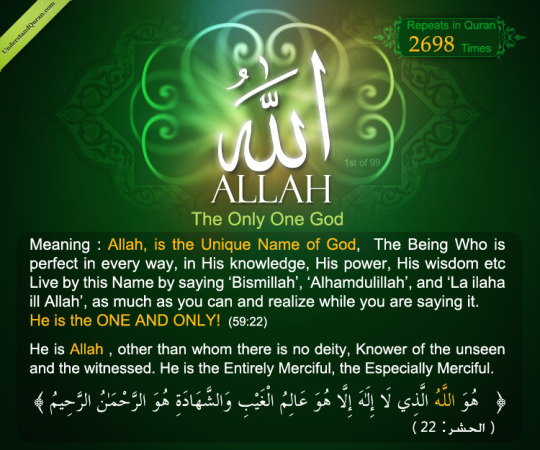



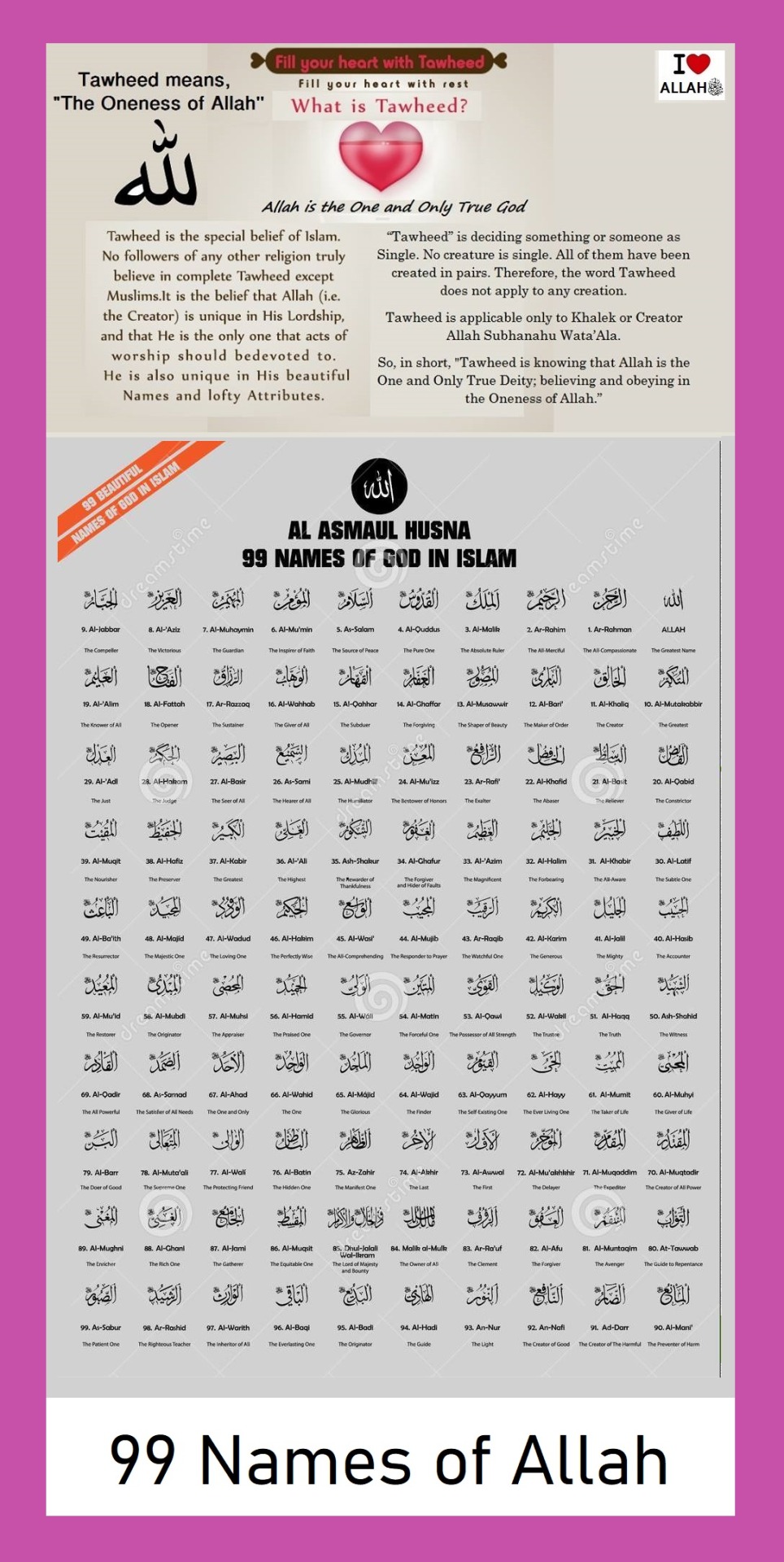


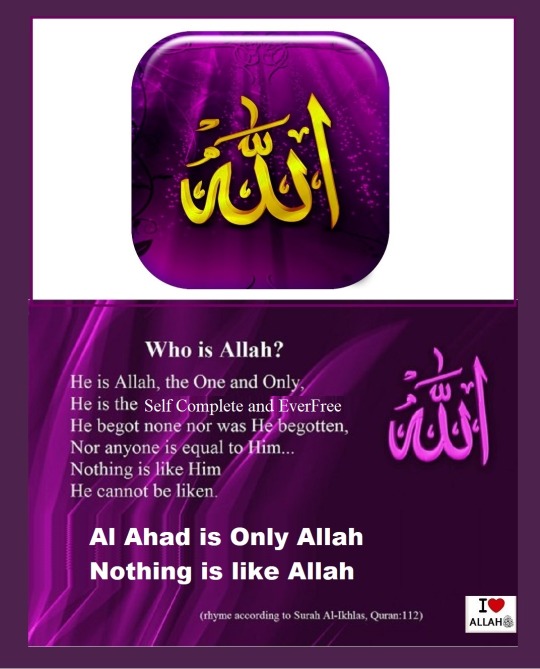
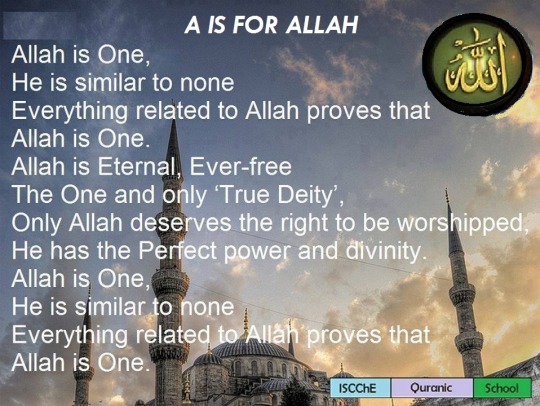
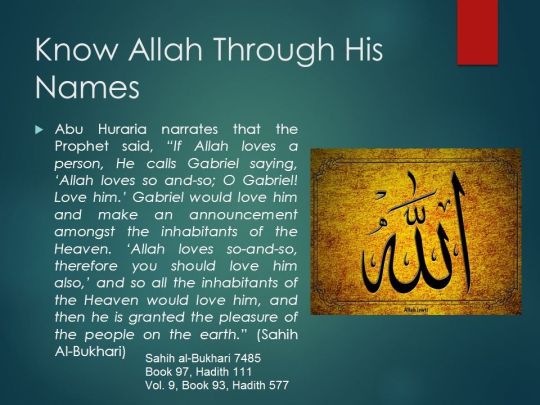
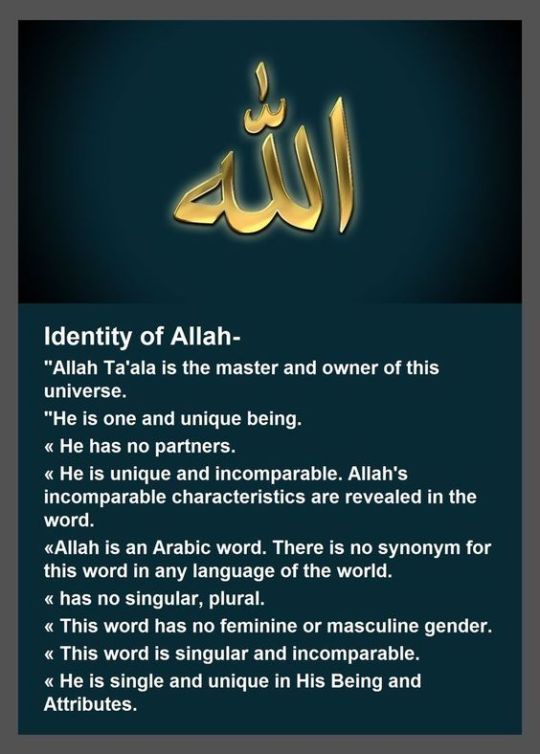

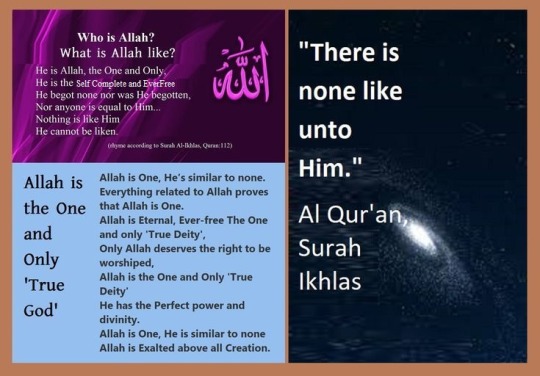
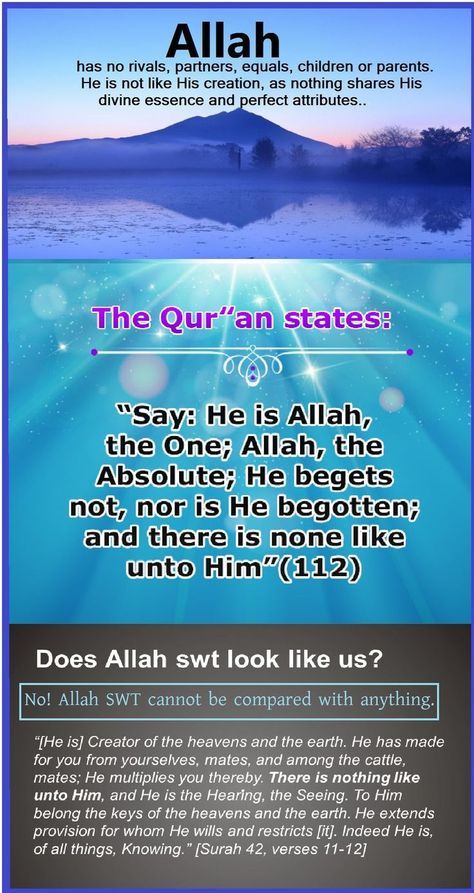
Benefits of Memorizing 99 Names of Allah
In the beautiful journey of Islamic spirituality, memorizing the 99 Names of Allah is like finding a special key that connects believers with the Creator. Memorizing the 99 Names of Allah has unique qualities representing divine attributes, that foster a deep spiritual connection with Allah.
The benefits of reciting Allah’s names include empowering you to face life’s challenges, build personal transformation, and cultivate inner peace.
10 Benefits of Learning 99 Names of Allah
10 Benefits of Learning 99 Names of Allah
1. Create a Spiritual Connection and Bonding with Allah
2. Memorizing Asma Ul Husna builds Personal Transformation
3. Learning Asmaul Husna Create Inner Peace
4. Empower you to Face Life’s Challenges
5. Increased Gratitude and Increased Compassion
6. Reciting Allah’s Names Provides Healing from Diseases
7. Asma Ul Husna Improved Decision-Making
8. Stress Relief and Resolve Psychological Issues
9. Boost your Self-esteem and Self-worth
10. Acceptance in Duas and Paradise’s Reward
1. Create a Spiritual Connection and Bonding with Allah
Learn how to pray with 99 names of Allah to enhance your spiritual connection and deepen your prayer experience. Memorizing the 99 Names of Allah is a powerful practice that creates a deep spiritual connection and bonding with the Almighty.
“And (all) the Most Beautiful Names belong to Allah, so call on Him by them.”
When you memorize Allah names, you engage in a profound dialogue with Allah, addressing Him with specific attributes that resonate with your spiritual journey. So, this practice enhances the quality of your prayers, making them more personal and heartfelt.
2. Memorizing Asma Ul Husna builds Personal Transformation
Memorizing and learning the meaning of Allah’s names plays an essential role in personal transformation. Therefore, these names help shape favourable character traits. The following are some personal changes related to memorizing these names:
Mercy and Compassion: Ar-Rahman (the Most Merciful) and Ar-Rahim (the Most Compassionate) inspire compassion. Memorizing these names promotes daily mercy and compassion.
Patient and Perseverance: As-Sabur (the Patient) and Al-Aziz (the Mighty) inspire patience and perseverance. Besides, this strengthens people via adversity.
Justice and Fairness: Al-Adl (the Just) and Al-Hakam (the Judge) promote justice and fairness in relationships. Also, this encourages morality and responsibility.
Wisdom and Knowledge: Al-Hakim (the Wise) and Al-Alim (the All-Knowing) inspire wisdom and knowledge. Furthermore, memorizing these names helps comprehension and informed decision-making.
Humility and Graciousness: Al-Mutakabbir (the Majestic) and Al-Karim (the Generous) encourage humility and graciousness. People with these traits improve their communities and relationships.
3. Learning Asmaul Husna Create Inner Peace
Memorizing Allah’s 99 Names brings inner tranquility during life’s turmoil. Remembering Asma’u Allah Alhusna relaxes, according to Surah Taha (20:8): “Allah—there is no god ˹worthy of worship˺ except Him. He has the Most Beautiful Names.”
Source of Comfort and Stress Relief
Ar-Rahman (the Most Merciful) and As-Salam (the Source of tranquillity) symbolize Allah’s infinite kindness and ultimate tranquillity. Moreover, this insight comforts you during difficult times.
Reciting these names relieves tension. In addition, it helps people cope with stress by focusing on Allah’s peace. Further, names like Al-Latif (the Subtle) and Al-Basir (the All-Seeing) let you understand Allah’s watchful presence.
4. Empower you to Face Life’s Challenges
Memorizing Allah’s 99 Names gives people courage and resilience to overcome life’s hardships. Recognition of Allah’s counsel and support underpins this empowerment.
Al-Qawi (the Strong) and Al-Matin (the Firm) inspire inner strength to overcome adversity. So, this awareness of supernatural strength boosts confidence in facing life’s obstacles. Moreover, Al-Hadi and Al-Hakim provide guidance.
In addition, memorizing names like Al-Wakil (the Trustee) builds faith in Allah’s plan. Furthermore, recognizing Allah as Al-Mujib (the Responsive) gives strength since prayers are heard and answered. Knowing Allah is responsive empowers people to persevere.
5. Increased Gratitude and Increased Compassion
Memorizing the 99 Names of Allah increases thankfulness and compassion, improving self- and other-image.
Ar-Razzaq (the Provider) evokes thanks for life’s plentiful benefits, inspiring thankfulness. Which name of Allah to recite for wealth? One of the names of Allah associated with wealth and sustenance is “Ar-Razzaq.
Which name of Allah to recite for help? One of the names of Allah that are often recited for seeking help is “Ya Mujeeb,” which translates to “O Responsive One”.
Furthermore, honouring the Most Merciful and Most Compassionate promotes self-compassion and healthy relationships. The name Al-Karim (the Generous) inspires people to help others.
6. Reciting Allah’s Names Provides Healing from Diseases
Reciting Allah’s Names might bring comfort and relief.
Spirit Healing: Reciting Allah’s names is said to calm and console those suffering physically or emotionally.
Emotional Well-being: Allah’s name may improve mental health and inner tranquillity.
Reciting the name Al-Shafi (the Healer) is believed to bring healing and protection.
7. Asma Ul Husna Improved Decision-Making
Memorizing the Asma Ul Husna helps people make divinely guided decisions. Get guidance from Al-Hakim. Al-Hakim (the Wise) encourages wise decision-making.
Recognition of Allah as Al-Alim (the All-Knowing) allows people to make informed decisions. Besides, it is because they rely on Allah’s wisdom that transcends human limitations.
8. Stress Relief and Resolve Psychological Issues
Memorizing the 99 Names of Allah reduces stress and resolves psychological disorders. Therefore, reciting these names relaxes the mind and heart during life’s trials. According to Surah Ar-Ra’d (13:28),
“those who believe and whose hearts find comfort in the remembrance of Allah. Surely in the remembrance of Allah do hearts find comfort.”
Reciting the Names of Allah may reduce tension, anxiety, and depression. Moreover, meditation on these celestial names shifts focus from negative emotions to calm and connection with the celestial.
9. Boost your Self-esteem and Self-worth
Memorizing the Asma Ul Husna boosts self-esteem and self-worth.
Recognition of Allah’s Creation
Knowing that Allah, as Al-Khaliq, created people with care and purpose boosts self-esteem. Recognizing that everyone is unique boosts self-esteem.
10. Acceptance in Duas and Paradise’s Reward
Remembering Allah’s 99 Names helps accept duas and promises of reward in heaven. Memorize 99 names of Allah hadith in Sahih al-Bukhari 7392, and Sahih Muslim 2677. Abu Huraira reported: The Prophet, PBUH, said,
“Allah has ninety-nine Names, one-hundred less one; and he who memorized them all by heart will enter Paradise.”
youtube
youtube
youtube
youtube
youtube
youtube
Allah is unique, almighty, the only Deity.
#tawheed#tawhid#whoisallah#allah'snature#trueGod#Deity#God#allah'sdefinition#ALLAH#ALLAHSWT#ALLAHMeanings#WhoisAllah#Asmawassifat#Asmaalhusna#99NamesofAllah#99Names#Allah'sNature#Allah'sNames#Allah'sAttrributes#Allah'sQualities#Allah'sDefinition#TrueGod#TrueDeity#Allah#Ilah#Lord#LaIlahaIllaAllah#WhoIsAllah#youtube#Youtube
0 notes
Text
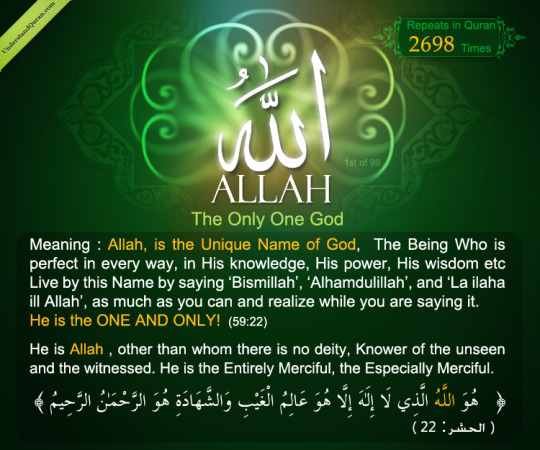



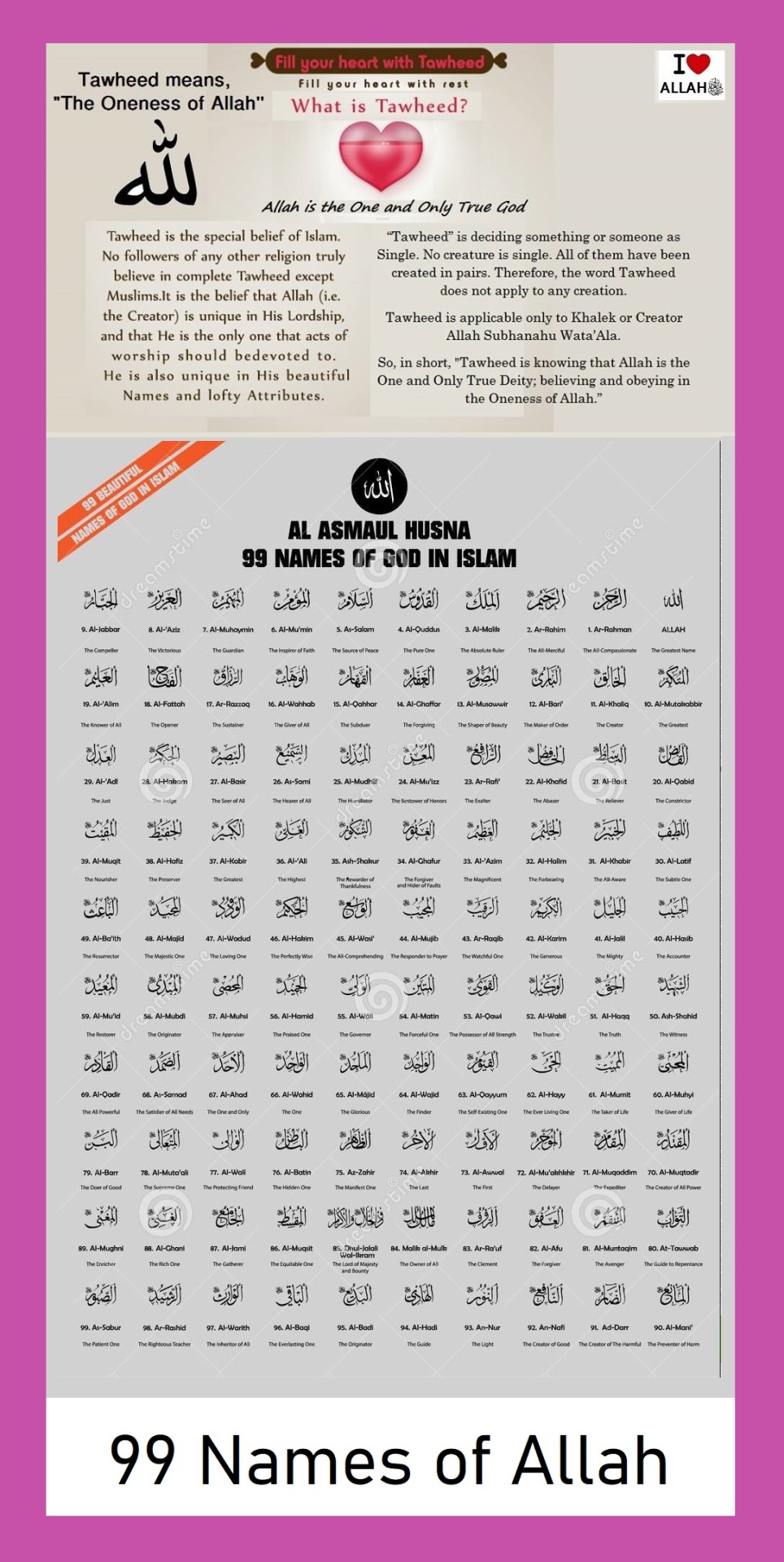

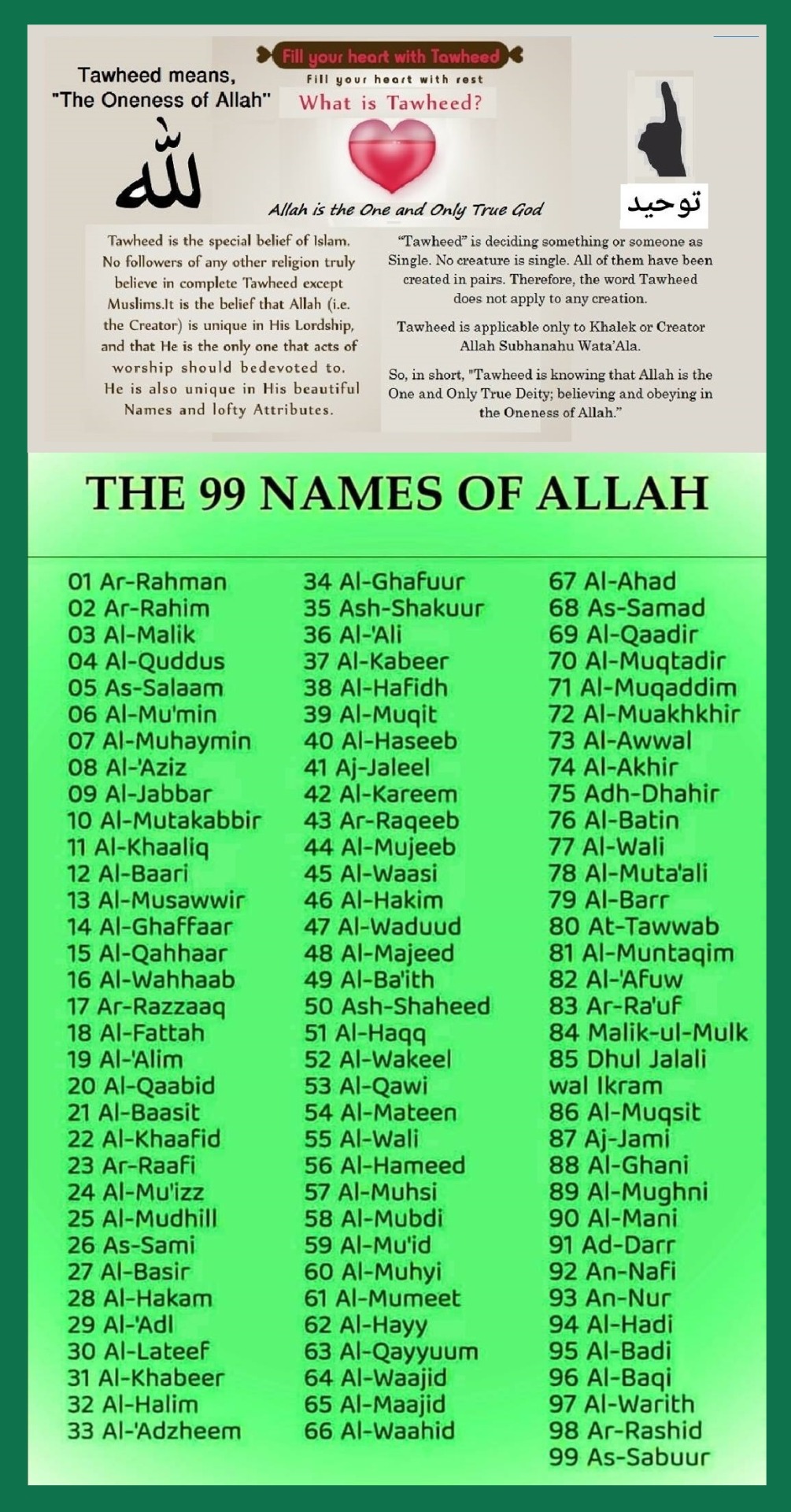
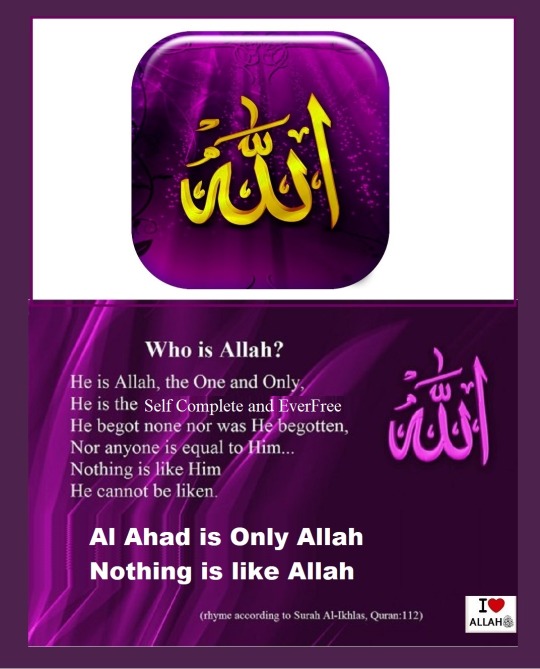
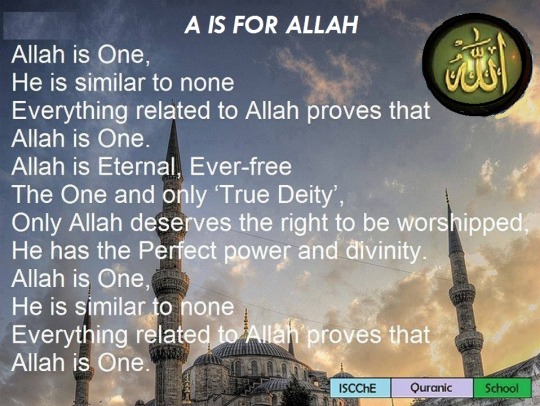

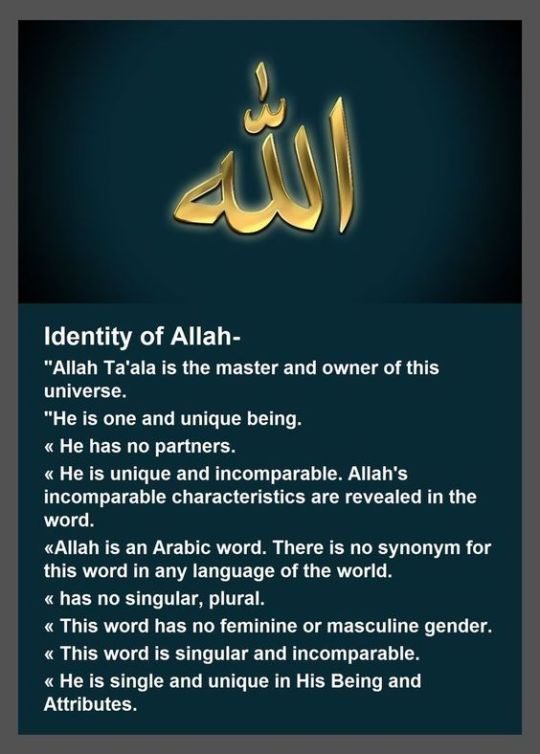

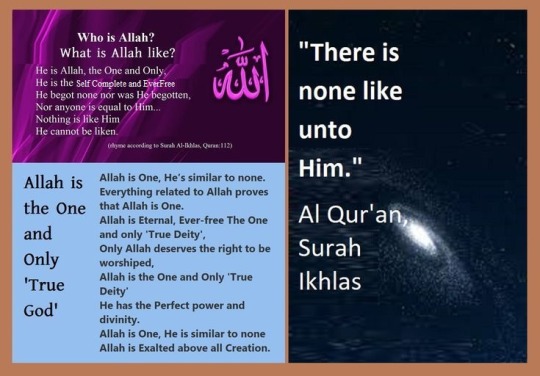
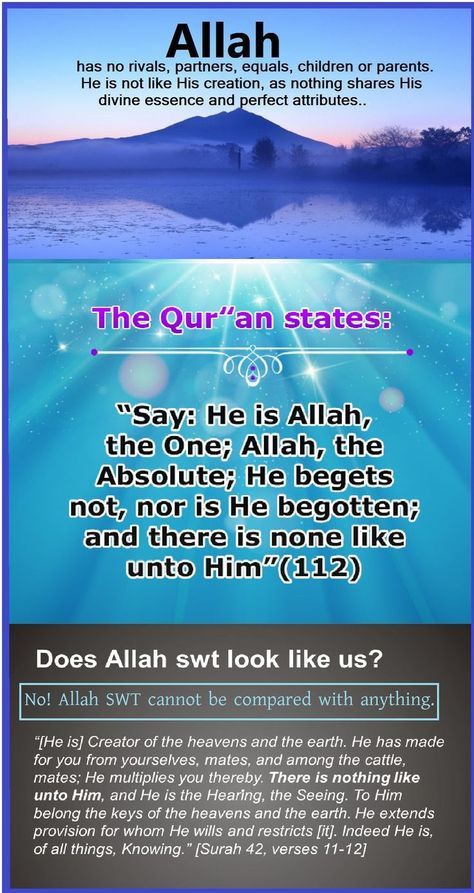
Benefits of Memorizing 99 Names of Allah
In the beautiful journey of Islamic spirituality, memorizing the 99 Names of Allah is like finding a special key that connects believers with the Creator. Memorizing the 99 Names of Allah has unique qualities representing divine attributes, that foster a deep spiritual connection with Allah.
The benefits of reciting Allah’s names include empowering you to face life’s challenges, build personal transformation, and cultivate inner peace.
10 Benefits of Learning 99 Names of Allah
10 Benefits of Learning 99 Names of Allah
1. Create a Spiritual Connection and Bonding with Allah
2. Memorizing Asma Ul Husna builds Personal Transformation
3. Learning Asmaul Husna Create Inner Peace
4. Empower you to Face Life’s Challenges
5. Increased Gratitude and Increased Compassion
6. Reciting Allah’s Names Provides Healing from Diseases
7. Asma Ul Husna Improved Decision-Making
8. Stress Relief and Resolve Psychological Issues
9. Boost your Self-esteem and Self-worth
10. Acceptance in Duas and Paradise’s Reward
1. Create a Spiritual Connection and Bonding with Allah
Learn how to pray with 99 names of Allah to enhance your spiritual connection and deepen your prayer experience. Memorizing the 99 Names of Allah is a powerful practice that creates a deep spiritual connection and bonding with the Almighty.
“And (all) the Most Beautiful Names belong to Allah, so call on Him by them.”
When you memorize Allah names, you engage in a profound dialogue with Allah, addressing Him with specific attributes that resonate with your spiritual journey. So, this practice enhances the quality of your prayers, making them more personal and heartfelt.
2. Memorizing Asma Ul Husna builds Personal Transformation
Memorizing and learning the meaning of Allah’s names plays an essential role in personal transformation. Therefore, these names help shape favourable character traits. The following are some personal changes related to memorizing these names:
Mercy and Compassion: Ar-Rahman (the Most Merciful) and Ar-Rahim (the Most Compassionate) inspire compassion. Memorizing these names promotes daily mercy and compassion.
Patient and Perseverance: As-Sabur (the Patient) and Al-Aziz (the Mighty) inspire patience and perseverance. Besides, this strengthens people via adversity.
Justice and Fairness: Al-Adl (the Just) and Al-Hakam (the Judge) promote justice and fairness in relationships. Also, this encourages morality and responsibility.
Wisdom and Knowledge: Al-Hakim (the Wise) and Al-Alim (the All-Knowing) inspire wisdom and knowledge. Furthermore, memorizing these names helps comprehension and informed decision-making.
Humility and Graciousness: Al-Mutakabbir (the Majestic) and Al-Karim (the Generous) encourage humility and graciousness. People with these traits improve their communities and relationships.
3. Learning Asmaul Husna Create Inner Peace
Memorizing Allah’s 99 Names brings inner tranquility during life’s turmoil. Remembering Asma’u Allah Alhusna relaxes, according to Surah Taha (20:8): “Allah—there is no god ˹worthy of worship˺ except Him. He has the Most Beautiful Names.”
Source of Comfort and Stress Relief
Ar-Rahman (the Most Merciful) and As-Salam (the Source of tranquillity) symbolize Allah’s infinite kindness and ultimate tranquillity. Moreover, this insight comforts you during difficult times.
Reciting these names relieves tension. In addition, it helps people cope with stress by focusing on Allah’s peace. Further, names like Al-Latif (the Subtle) and Al-Basir (the All-Seeing) let you understand Allah’s watchful presence.
4. Empower you to Face Life’s Challenges
Memorizing Allah’s 99 Names gives people courage and resilience to overcome life’s hardships. Recognition of Allah’s counsel and support underpins this empowerment.
Al-Qawi (the Strong) and Al-Matin (the Firm) inspire inner strength to overcome adversity. So, this awareness of supernatural strength boosts confidence in facing life’s obstacles. Moreover, Al-Hadi and Al-Hakim provide guidance.
In addition, memorizing names like Al-Wakil (the Trustee) builds faith in Allah’s plan. Furthermore, recognizing Allah as Al-Mujib (the Responsive) gives strength since prayers are heard and answered. Knowing Allah is responsive empowers people to persevere.
5. Increased Gratitude and Increased Compassion
Memorizing the 99 Names of Allah increases thankfulness and compassion, improving self- and other-image.
Ar-Razzaq (the Provider) evokes thanks for life’s plentiful benefits, inspiring thankfulness. Which name of Allah to recite for wealth? One of the names of Allah associated with wealth and sustenance is “Ar-Razzaq.
Which name of Allah to recite for help? One of the names of Allah that are often recited for seeking help is “Ya Mujeeb,” which translates to “O Responsive One”.
Furthermore, honouring the Most Merciful and Most Compassionate promotes self-compassion and healthy relationships. The name Al-Karim (the Generous) inspires people to help others.
6. Reciting Allah’s Names Provides Healing from Diseases
Reciting Allah’s Names might bring comfort and relief.
Spirit Healing: Reciting Allah’s names is said to calm and console those suffering physically or emotionally.
Emotional Well-being: Allah’s name may improve mental health and inner tranquillity.
Reciting the name Al-Shafi (the Healer) is believed to bring healing and protection.
7. Asma Ul Husna Improved Decision-Making
Memorizing the Asma Ul Husna helps people make divinely guided decisions. Get guidance from Al-Hakim. Al-Hakim (the Wise) encourages wise decision-making.
Recognition of Allah as Al-Alim (the All-Knowing) allows people to make informed decisions. Besides, it is because they rely on Allah’s wisdom that transcends human limitations.
8. Stress Relief and Resolve Psychological Issues
Memorizing the 99 Names of Allah reduces stress and resolves psychological disorders. Therefore, reciting these names relaxes the mind and heart during life’s trials. According to Surah Ar-Ra’d (13:28),
“those who believe and whose hearts find comfort in the remembrance of Allah. Surely in the remembrance of Allah do hearts find comfort.”
Reciting the Names of Allah may reduce tension, anxiety, and depression. Moreover, meditation on these celestial names shifts focus from negative emotions to calm and connection with the celestial.
9. Boost your Self-esteem and Self-worth
Memorizing the Asma Ul Husna boosts self-esteem and self-worth.
Recognition of Allah’s Creation
Knowing that Allah, as Al-Khaliq, created people with care and purpose boosts self-esteem. Recognizing that everyone is unique boosts self-esteem.
10. Acceptance in Duas and Paradise’s Reward
Remembering Allah’s 99 Names helps accept duas and promises of reward in heaven. Memorize 99 names of Allah hadith in Sahih al-Bukhari 7392, and Sahih Muslim 2677. Abu Huraira reported: The Prophet, PBUH, said,
“Allah has ninety-nine Names, one-hundred less one; and he who memorized them all by heart will enter Paradise.”
youtube
youtube
youtube
youtube
youtube
youtube
Allah is unique, almighty, the only Deity.
#allahswt#allah'snature#tawheed#asmawassifat#whoisallah#tawhid#allah'snames#allah'sdefinition#ALLAH#ALLAHSWT#ALLAHMeanings#WhoisAllah#Asmawassifat#Asmaalhusna#99NamesofAllah#99Names#Allah'sNature#Allah'sNames#Allah'sAttrributes#Allah'sQualities#Allah'sDefinition#TrueGod#TrueDeity#Allah#God#Deity#Ilah#Lord#LaIlahaIllaAllah#WhoIsAllah
0 notes
Text
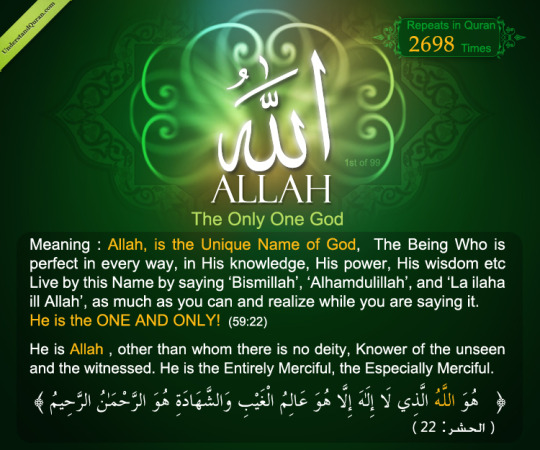



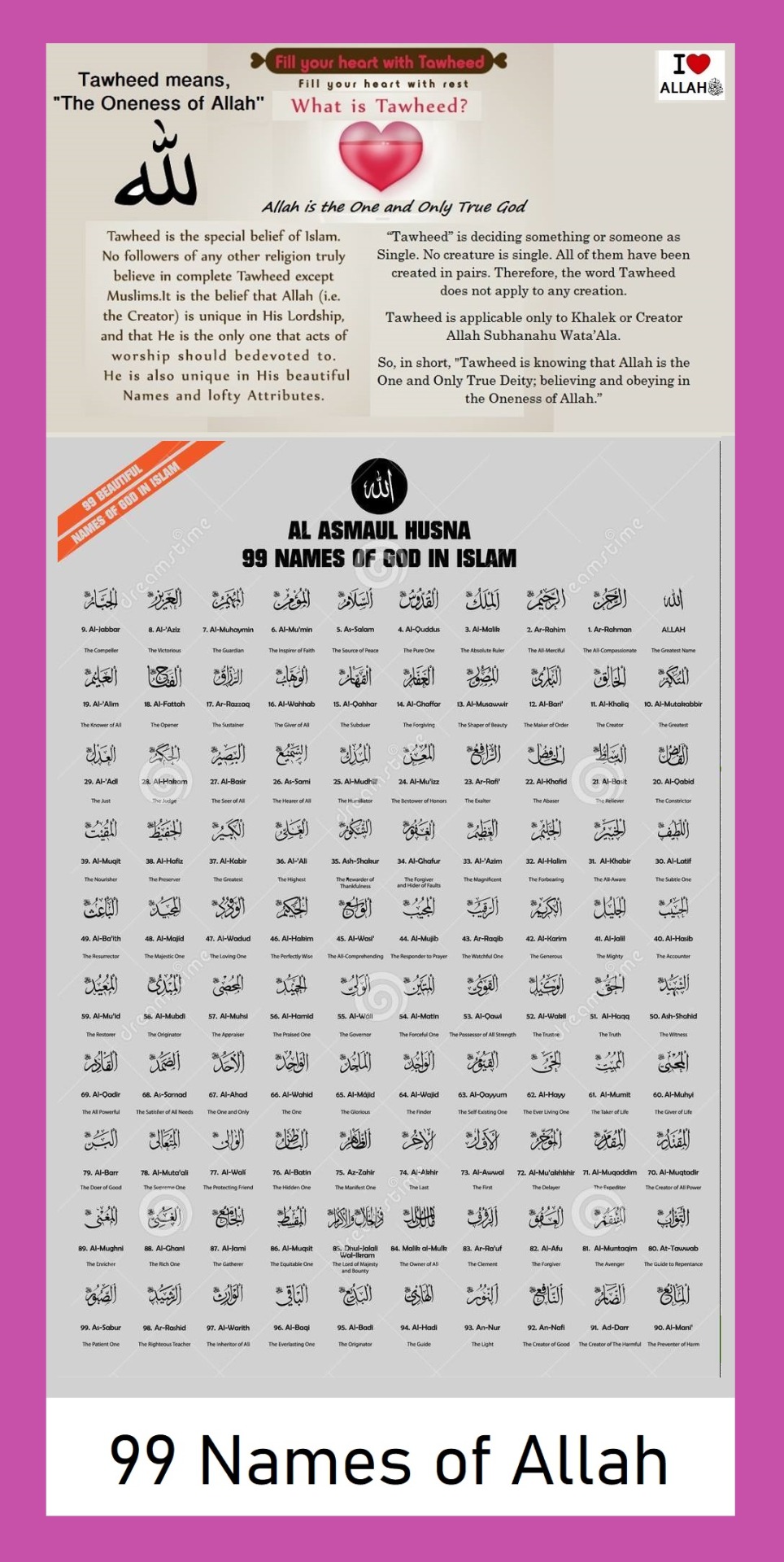

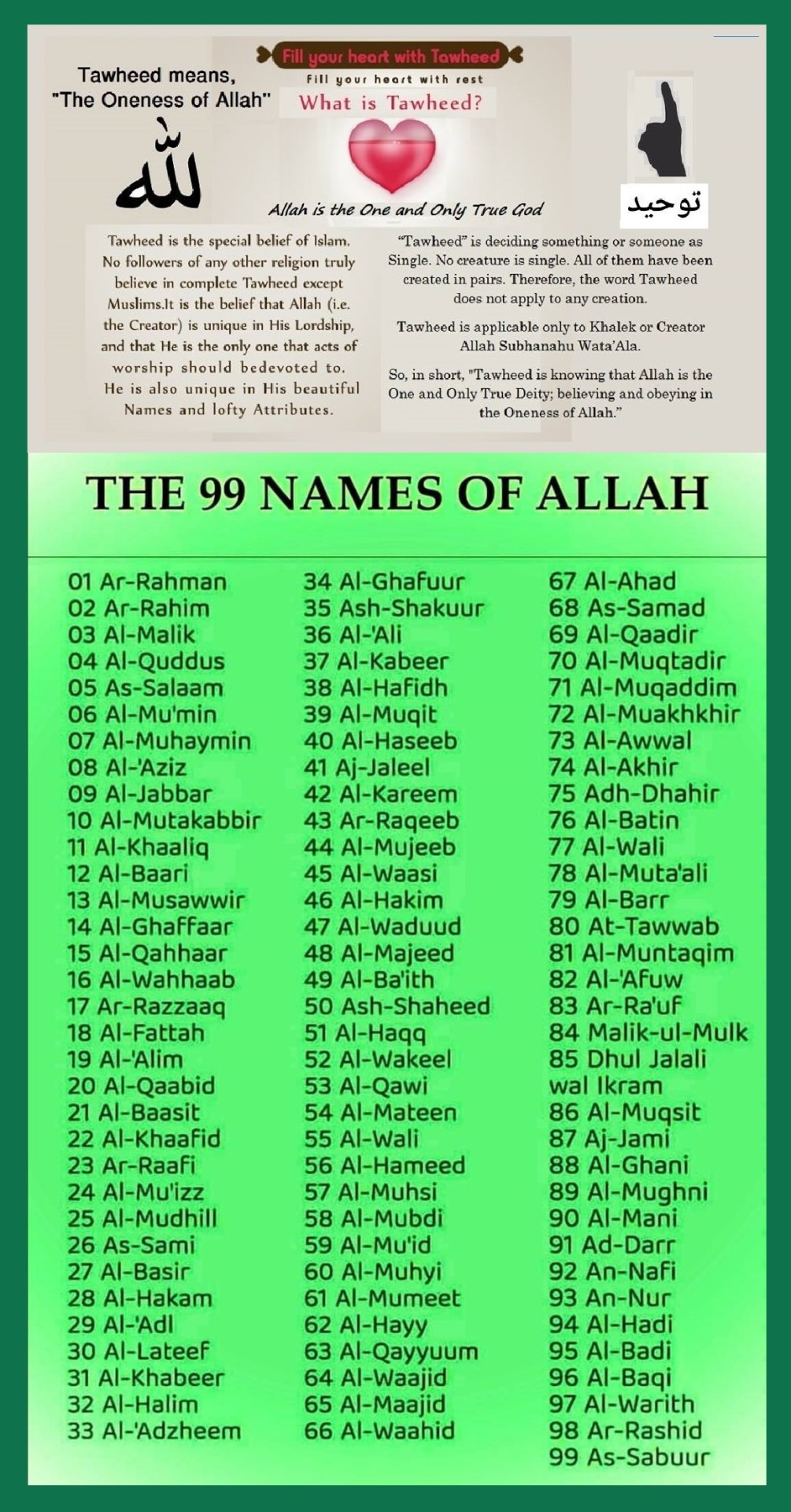
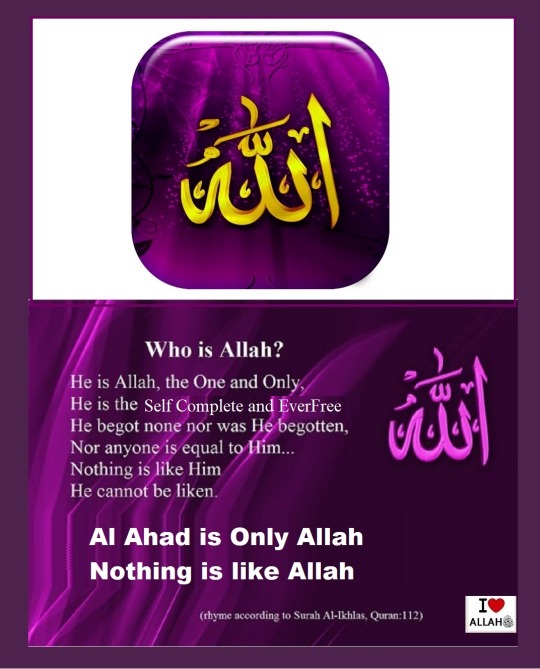
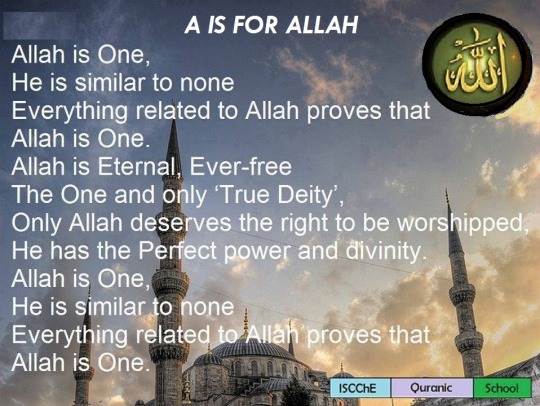
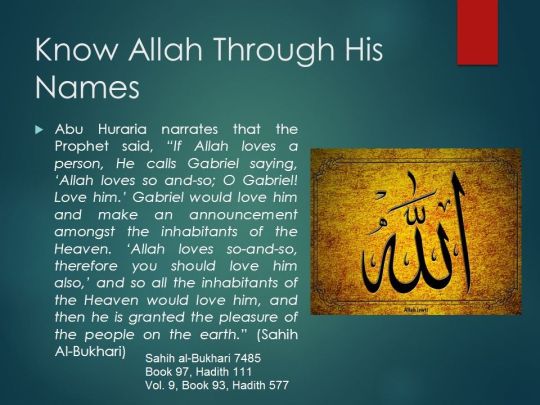
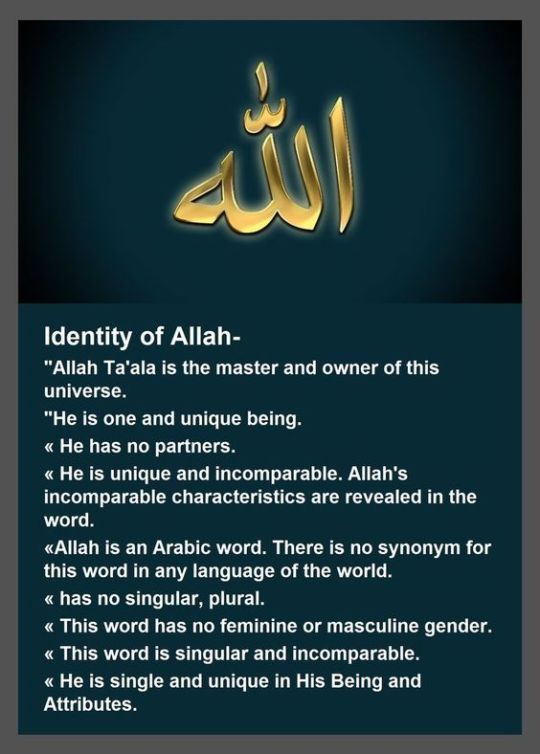

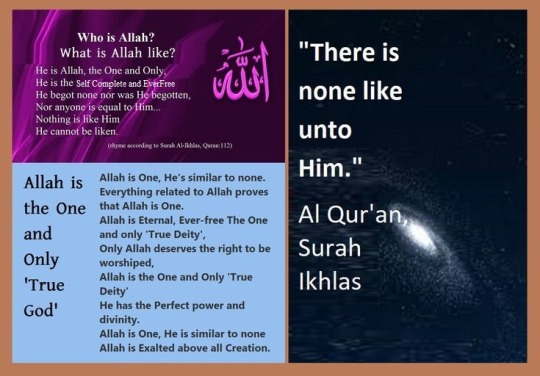
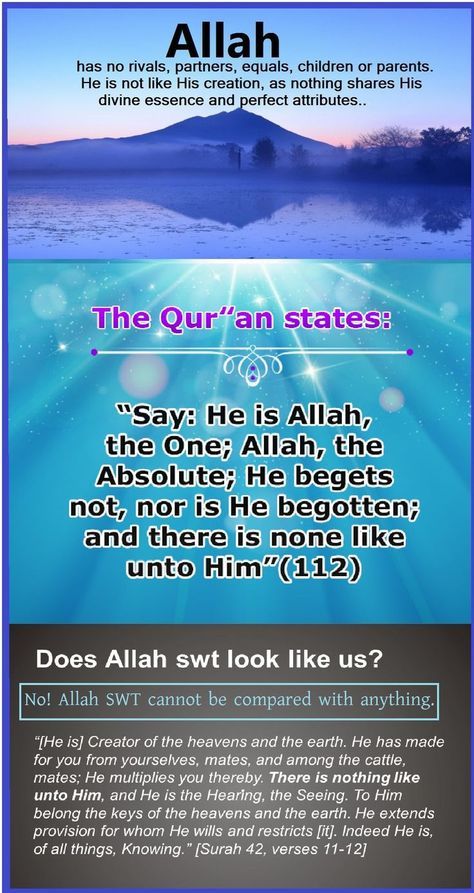
Benefits of Memorizing 99 Names of Allah
In the beautiful journey of Islamic spirituality, memorizing the 99 Names of Allah is like finding a special key that connects believers with the Creator. Memorizing the 99 Names of Allah has unique qualities representing divine attributes, that foster a deep spiritual connection with Allah.
The benefits of reciting Allah’s names include empowering you to face life’s challenges, build personal transformation, and cultivate inner peace.
10 Benefits of Learning 99 Names of Allah
10 Benefits of Learning 99 Names of Allah
1. Create a Spiritual Connection and Bonding with Allah
2. Memorizing Asma Ul Husna builds Personal Transformation
3. Learning Asmaul Husna Create Inner Peace
4. Empower you to Face Life’s Challenges
5. Increased Gratitude and Increased Compassion
6. Reciting Allah’s Names Provides Healing from Diseases
7. Asma Ul Husna Improved Decision-Making
8. Stress Relief and Resolve Psychological Issues
9. Boost your Self-esteem and Self-worth
10. Acceptance in Duas and Paradise’s Reward
1. Create a Spiritual Connection and Bonding with Allah
Learn how to pray with 99 names of Allah to enhance your spiritual connection and deepen your prayer experience. Memorizing the 99 Names of Allah is a powerful practice that creates a deep spiritual connection and bonding with the Almighty.
“And (all) the Most Beautiful Names belong to Allah, so call on Him by them.”
When you memorize Allah names, you engage in a profound dialogue with Allah, addressing Him with specific attributes that resonate with your spiritual journey. So, this practice enhances the quality of your prayers, making them more personal and heartfelt.
2. Memorizing Asma Ul Husna builds Personal Transformation
Memorizing and learning the meaning of Allah’s names plays an essential role in personal transformation. Therefore, these names help shape favourable character traits. The following are some personal changes related to memorizing these names:
Mercy and Compassion: Ar-Rahman (the Most Merciful) and Ar-Rahim (the Most Compassionate) inspire compassion. Memorizing these names promotes daily mercy and compassion.
Patient and Perseverance: As-Sabur (the Patient) and Al-Aziz (the Mighty) inspire patience and perseverance. Besides, this strengthens people via adversity.
Justice and Fairness: Al-Adl (the Just) and Al-Hakam (the Judge) promote justice and fairness in relationships. Also, this encourages morality and responsibility.
Wisdom and Knowledge: Al-Hakim (the Wise) and Al-Alim (the All-Knowing) inspire wisdom and knowledge. Furthermore, memorizing these names helps comprehension and informed decision-making.
Humility and Graciousness: Al-Mutakabbir (the Majestic) and Al-Karim (the Generous) encourage humility and graciousness. People with these traits improve their communities and relationships.
3. Learning Asmaul Husna Create Inner Peace
Memorizing Allah’s 99 Names brings inner tranquility during life’s turmoil. Remembering Asma’u Allah Alhusna relaxes, according to Surah Taha (20:8): “Allah—there is no god ˹worthy of worship˺ except Him. He has the Most Beautiful Names.”
Source of Comfort and Stress Relief
Ar-Rahman (the Most Merciful) and As-Salam (the Source of tranquillity) symbolize Allah’s infinite kindness and ultimate tranquillity. Moreover, this insight comforts you during difficult times.
Reciting these names relieves tension. In addition, it helps people cope with stress by focusing on Allah’s peace. Further, names like Al-Latif (the Subtle) and Al-Basir (the All-Seeing) let you understand Allah’s watchful presence.
4. Empower you to Face Life’s Challenges
Memorizing Allah’s 99 Names gives people courage and resilience to overcome life’s hardships. Recognition of Allah’s counsel and support underpins this empowerment.
Al-Qawi (the Strong) and Al-Matin (the Firm) inspire inner strength to overcome adversity. So, this awareness of supernatural strength boosts confidence in facing life’s obstacles. Moreover, Al-Hadi and Al-Hakim provide guidance.
In addition, memorizing names like Al-Wakil (the Trustee) builds faith in Allah’s plan. Furthermore, recognizing Allah as Al-Mujib (the Responsive) gives strength since prayers are heard and answered. Knowing Allah is responsive empowers people to persevere.
5. Increased Gratitude and Increased Compassion
Memorizing the 99 Names of Allah increases thankfulness and compassion, improving self- and other-image.
Ar-Razzaq (the Provider) evokes thanks for life’s plentiful benefits, inspiring thankfulness. Which name of Allah to recite for wealth? One of the names of Allah associated with wealth and sustenance is “Ar-Razzaq.
Which name of Allah to recite for help? One of the names of Allah that are often recited for seeking help is “Ya Mujeeb,” which translates to “O Responsive One”.
Furthermore, honouring the Most Merciful and Most Compassionate promotes self-compassion and healthy relationships. The name Al-Karim (the Generous) inspires people to help others.
6. Reciting Allah’s Names Provides Healing from Diseases
Reciting Allah’s Names might bring comfort and relief.
Spirit Healing: Reciting Allah’s names is said to calm and console those suffering physically or emotionally.
Emotional Well-being: Allah’s name may improve mental health and inner tranquillity.
Reciting the name Al-Shafi (the Healer) is believed to bring healing and protection.
7. Asma Ul Husna Improved Decision-Making
Memorizing the Asma Ul Husna helps people make divinely guided decisions. Get guidance from Al-Hakim. Al-Hakim (the Wise) encourages wise decision-making.
Recognition of Allah as Al-Alim (the All-Knowing) allows people to make informed decisions. Besides, it is because they rely on Allah’s wisdom that transcends human limitations.
8. Stress Relief and Resolve Psychological Issues
Memorizing the 99 Names of Allah reduces stress and resolves psychological disorders. Therefore, reciting these names relaxes the mind and heart during life’s trials. According to Surah Ar-Ra’d (13:28),
“those who believe and whose hearts find comfort in the remembrance of Allah. Surely in the remembrance of Allah do hearts find comfort.”
Reciting the Names of Allah may reduce tension, anxiety, and depression. Moreover, meditation on these celestial names shifts focus from negative emotions to calm and connection with the celestial.
9. Boost your Self-esteem and Self-worth
Memorizing the Asma Ul Husna boosts self-esteem and self-worth.
Recognition of Allah’s Creation
Knowing that Allah, as Al-Khaliq, created people with care and purpose boosts self-esteem. Recognizing that everyone is unique boosts self-esteem.
10. Acceptance in Duas and Paradise’s Reward
Remembering Allah’s 99 Names helps accept duas and promises of reward in heaven. Memorize 99 names of Allah hadith in Sahih al-Bukhari 7392, and Sahih Muslim 2677. Abu Huraira reported: The Prophet, PBUH, said,
“Allah has ninety-nine Names, one-hundred less one; and he who memorized them all by heart will enter Paradise.”
youtube
youtube
youtube
youtube
youtube
youtube
Allah is unique, almighty, the only Deity.
#tawheed#tawhid#allah'snature#asmawassifat#whoisallah#God#Deity#allah'sdefinition#ALLAH#ALLAHSWT#ALLAHMeanings#WhoisAllah#Asmawassifat#Asmaalhusna#99NamesofAllah#99Names#Allah'sNature#Allah'sNames#Allah'sAttrributes#Allah'sQualities#Allah'sDefinition#TrueGod#TrueDeity#Allah#Ilah#Lord#LaIlahaIllaAllah#WhoIsAllah#youtube#Youtube
0 notes
Text
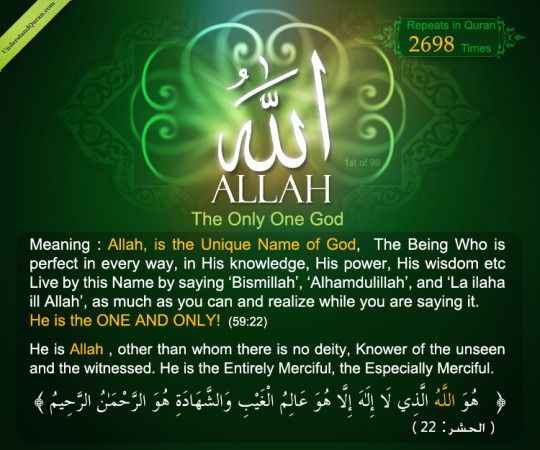



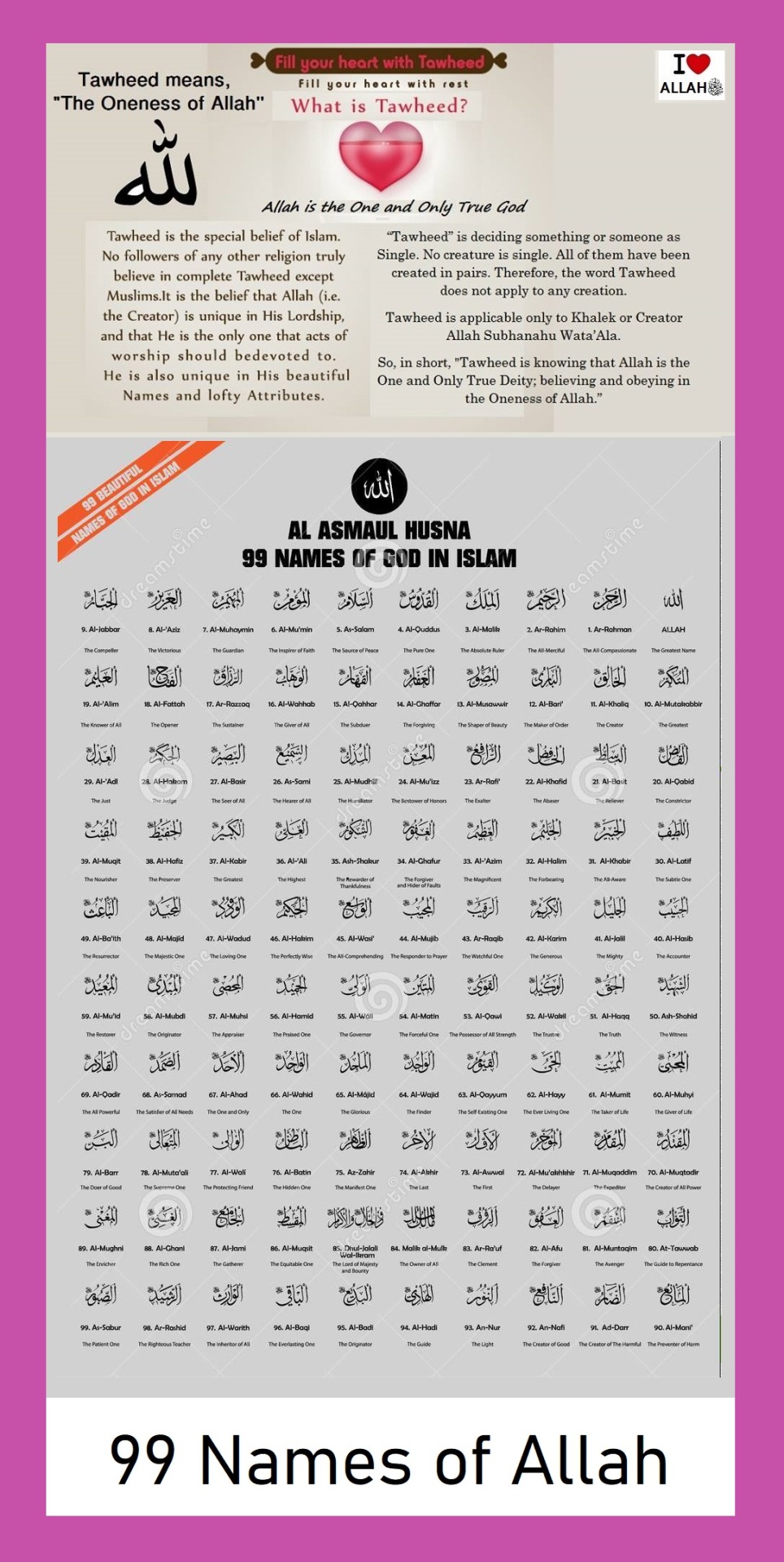

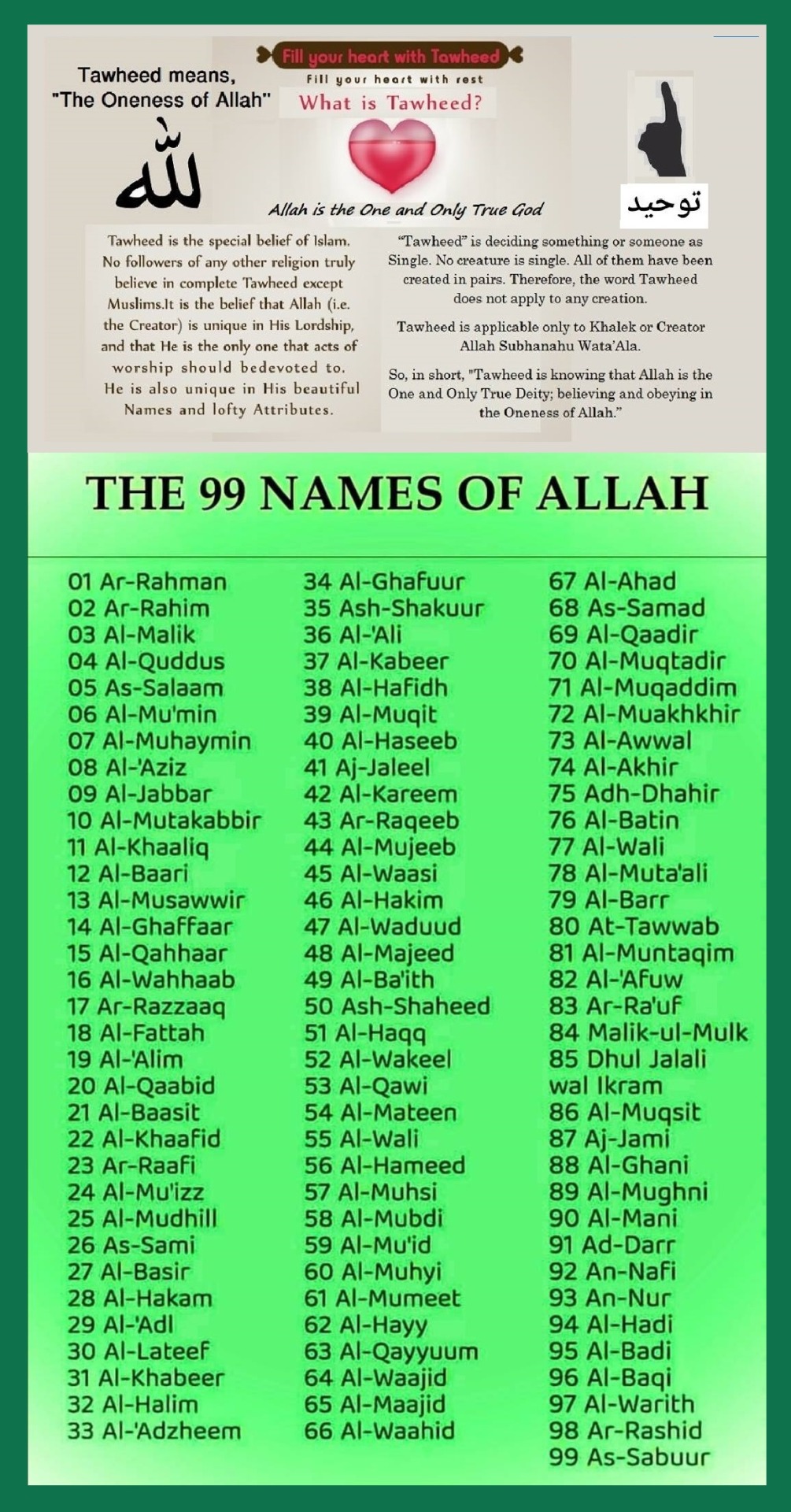
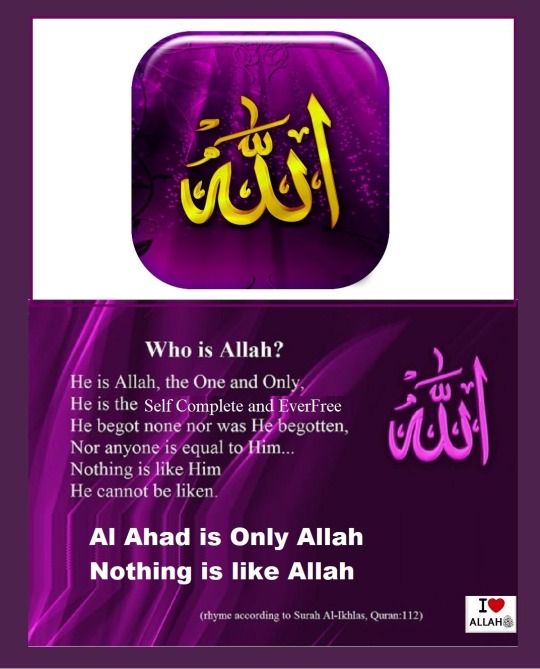
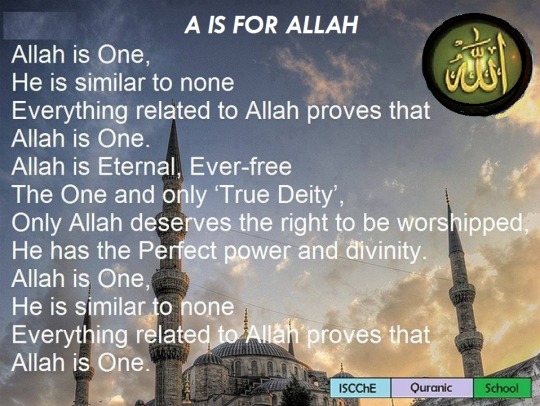
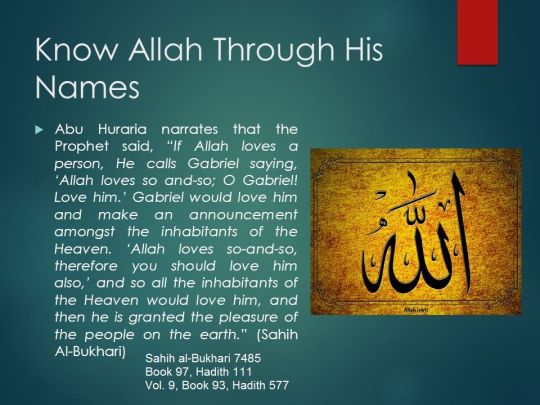
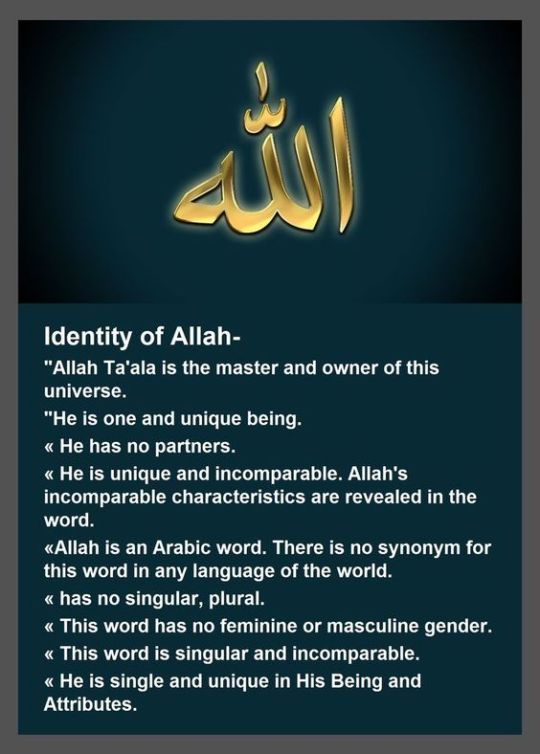

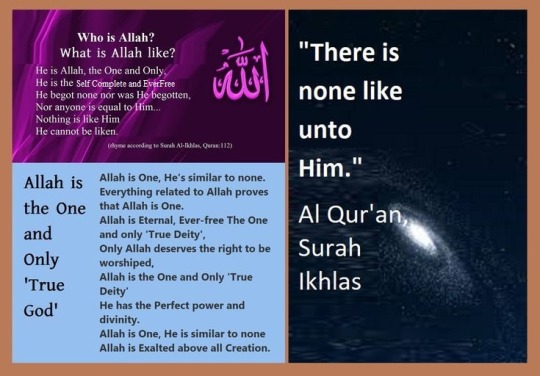
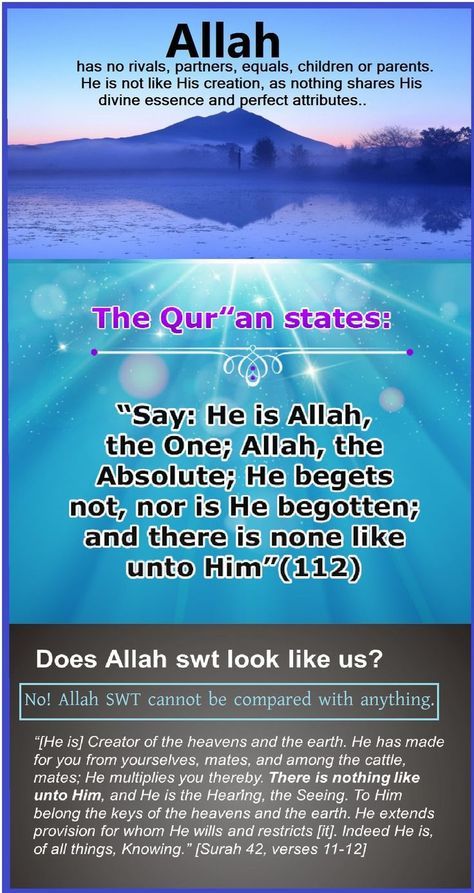
Benefits of Memorizing 99 Names of Allah
In the beautiful journey of Islamic spirituality, memorizing the 99 Names of Allah is like finding a special key that connects believers with the Creator. Memorizing the 99 Names of Allah has unique qualities representing divine attributes, that foster a deep spiritual connection with Allah.
The benefits of reciting Allah’s names include empowering you to face life’s challenges, build personal transformation, and cultivate inner peace.
10 Benefits of Learning 99 Names of Allah
10 Benefits of Learning 99 Names of Allah
1. Create a Spiritual Connection and Bonding with Allah
2. Memorizing Asma Ul Husna builds Personal Transformation
3. Learning Asmaul Husna Create Inner Peace
4. Empower you to Face Life’s Challenges
5. Increased Gratitude and Increased Compassion
6. Reciting Allah’s Names Provides Healing from Diseases
7. Asma Ul Husna Improved Decision-Making
8. Stress Relief and Resolve Psychological Issues
9. Boost your Self-esteem and Self-worth
10. Acceptance in Duas and Paradise’s Reward
1. Create a Spiritual Connection and Bonding with Allah
Learn how to pray with 99 names of Allah to enhance your spiritual connection and deepen your prayer experience. Memorizing the 99 Names of Allah is a powerful practice that creates a deep spiritual connection and bonding with the Almighty.
“And (all) the Most Beautiful Names belong to Allah, so call on Him by them.”
When you memorize Allah names, you engage in a profound dialogue with Allah, addressing Him with specific attributes that resonate with your spiritual journey. So, this practice enhances the quality of your prayers, making them more personal and heartfelt.
2. Memorizing Asma Ul Husna builds Personal Transformation
Memorizing and learning the meaning of Allah’s names plays an essential role in personal transformation. Therefore, these names help shape favourable character traits. The following are some personal changes related to memorizing these names:
Mercy and Compassion: Ar-Rahman (the Most Merciful) and Ar-Rahim (the Most Compassionate) inspire compassion. Memorizing these names promotes daily mercy and compassion.
Patient and Perseverance: As-Sabur (the Patient) and Al-Aziz (the Mighty) inspire patience and perseverance. Besides, this strengthens people via adversity.
Justice and Fairness: Al-Adl (the Just) and Al-Hakam (the Judge) promote justice and fairness in relationships. Also, this encourages morality and responsibility.
Wisdom and Knowledge: Al-Hakim (the Wise) and Al-Alim (the All-Knowing) inspire wisdom and knowledge. Furthermore, memorizing these names helps comprehension and informed decision-making.
Humility and Graciousness: Al-Mutakabbir (the Majestic) and Al-Karim (the Generous) encourage humility and graciousness. People with these traits improve their communities and relationships.
3. Learning Asmaul Husna Create Inner Peace
Memorizing Allah’s 99 Names brings inner tranquility during life’s turmoil. Remembering Asma’u Allah Alhusna relaxes, according to Surah Taha (20:8): “Allah—there is no god ˹worthy of worship˺ except Him. He has the Most Beautiful Names.”
Source of Comfort and Stress Relief
Ar-Rahman (the Most Merciful) and As-Salam (the Source of tranquillity) symbolize Allah’s infinite kindness and ultimate tranquillity. Moreover, this insight comforts you during difficult times.
Reciting these names relieves tension. In addition, it helps people cope with stress by focusing on Allah’s peace. Further, names like Al-Latif (the Subtle) and Al-Basir (the All-Seeing) let you understand Allah’s watchful presence.
4. Empower you to Face Life’s Challenges
Memorizing Allah’s 99 Names gives people courage and resilience to overcome life’s hardships. Recognition of Allah’s counsel and support underpins this empowerment.
Al-Qawi (the Strong) and Al-Matin (the Firm) inspire inner strength to overcome adversity. So, this awareness of supernatural strength boosts confidence in facing life’s obstacles. Moreover, Al-Hadi and Al-Hakim provide guidance.
In addition, memorizing names like Al-Wakil (the Trustee) builds faith in Allah’s plan. Furthermore, recognizing Allah as Al-Mujib (the Responsive) gives strength since prayers are heard and answered. Knowing Allah is responsive empowers people to persevere.
5. Increased Gratitude and Increased Compassion
Memorizing the 99 Names of Allah increases thankfulness and compassion, improving self- and other-image.
Ar-Razzaq (the Provider) evokes thanks for life’s plentiful benefits, inspiring thankfulness. Which name of Allah to recite for wealth? One of the names of Allah associated with wealth and sustenance is “Ar-Razzaq.
Which name of Allah to recite for help? One of the names of Allah that are often recited for seeking help is “Ya Mujeeb,” which translates to “O Responsive One”.
Furthermore, honouring the Most Merciful and Most Compassionate promotes self-compassion and healthy relationships. The name Al-Karim (the Generous) inspires people to help others.
6. Reciting Allah’s Names Provides Healing from Diseases
Reciting Allah’s Names might bring comfort and relief.
Spirit Healing: Reciting Allah’s names is said to calm and console those suffering physically or emotionally.
Emotional Well-being: Allah’s name may improve mental health and inner tranquillity.
Reciting the name Al-Shafi (the Healer) is believed to bring healing and protection.
7. Asma Ul Husna Improved Decision-Making
Memorizing the Asma Ul Husna helps people make divinely guided decisions. Get guidance from Al-Hakim. Al-Hakim (the Wise) encourages wise decision-making.
Recognition of Allah as Al-Alim (the All-Knowing) allows people to make informed decisions. Besides, it is because they rely on Allah’s wisdom that transcends human limitations.
8. Stress Relief and Resolve Psychological Issues
Memorizing the 99 Names of Allah reduces stress and resolves psychological disorders. Therefore, reciting these names relaxes the mind and heart during life’s trials. According to Surah Ar-Ra’d (13:28),
“those who believe and whose hearts find comfort in the remembrance of Allah. Surely in the remembrance of Allah do hearts find comfort.”
Reciting the Names of Allah may reduce tension, anxiety, and depression. Moreover, meditation on these celestial names shifts focus from negative emotions to calm and connection with the celestial.
9. Boost your Self-esteem and Self-worth
Memorizing the Asma Ul Husna boosts self-esteem and self-worth.
Recognition of Allah’s Creation
Knowing that Allah, as Al-Khaliq, created people with care and purpose boosts self-esteem. Recognizing that everyone is unique boosts self-esteem.
10. Acceptance in Duas and Paradise’s Reward
Remembering Allah’s 99 Names helps accept duas and promises of reward in heaven. Memorize 99 names of Allah hadith in Sahih al-Bukhari 7392, and Sahih Muslim 2677. Abu Huraira reported: The Prophet, PBUH, said,
“Allah has ninety-nine Names, one-hundred less one; and he who memorized them all by heart will enter Paradise.”
youtube
youtube
youtube
youtube
youtube
youtube
Allah is unique, almighty, the only Deity.
#allahswt#allah'snature#whoisallah#tawheed#trueGod#allah'snames#ALLAH#ALLAHSWT#ALLAHMeanings#WhoisAllah#Asmawassifat#Asmaalhusna#99NamesofAllah#99Names#Allah'sNature#Allah'sNames#Allah'sAttrributes#Allah'sQualities#Allah'sDefinition#TrueGod#TrueDeity#Allah#God#Deity#Ilah#Lord#LaIlahaIllaAllah#WhoIsAllah#tawhid#youtube
0 notes
Text
Quiz: How well do you know the 99 names of Allah? 20 questions
A quiz about the 99 names of Allah أسماء) الله). The 99 words are attributed to God by Muslims.
https://arabic-for-nerds.com/quiz/quiz-99-names-allah/?feed_id=5329&utm_source=Tumblr&utm_medium=geralddrissner&utm_campaign=FS%20Poster
0 notes
Text
benefits of the 99 names of allah | Quran Spirit
There are many sciences that a person can get acquainted with, but one of the most important and greatest of them is the knowledge of Allah Almighty, by learning 99 names of allah and attributes, by referring to the Qur’anic texts and the honorable Sunnah of the Prophet, and Allah said:
These sciences urge the Muslim to get closer to Allah Almighty and get to know Him, and the Messenger, may Allah prayers and peace be upon him, has recommended to us the necessity of learning 99names of allah, understanding their meanings and memorizing them, and acting according to them.
And Allah made the reward of those who count all 99 names of allah
enter Paradise. As the prophet may Allah prayers and peace be upon him, said: "Indeed, Allah has ninety-nine Names, whoever counts them shall enter Paradise."
99 names of Allah meaning
The 99 names allah according to the narration of Al-Waleed bin Muslim according to Al-Tirmidhi are as follows:
Allah: It is the greatest name that for Allah alone, Glory be to Him, singled out Himself, made it the first of His names, and added them all to Himself.
Ar-Rahman: Much Mercy, and it is a name restricted to Allah Almighty, and it is not permissible to say Rahman to other than Allah, because His mercy encompasses everything, and Allah is the Most Merciful of the merciful.
Al-Rahim: Allah is the Ever-Blessing, and His mercy is endless.
Almalik: Allah malik Almoulk and Allah is the malik of the Day of Judgment, and the malik of creation, for He is the Absolute Owner.
Alkdous: Allah is the pure one who is clear of faults and shortcomings and of all that is surrounded by minds.
Alslam: Allah is the spreader of peace among people, and he is the one who delivered himself from deficiency, defect and annihilation.
Al Mu'min: Allah is the one who delivered his guardians from his torment, and the one who fulfills his servants what he promised them.
Al-Muhamin: Allah is the Watcher, the Preserver of everything, who is in charge of His creation with their actions, their livelihoods and their deadlines, and who is aware of the secrets of matters and the secrets of the breasts.
Al-Aziz: Allah is the only one with glory, the apparent, the invincible, the powerful, the abstaining, so nothing can defeat him, and Allah is the conqueror of everything.
Al-Jabbar: Allah is the one whose will is carried out, and no one deviates from his estimation, and Allah is the omnipotent of his creation according to what he wanted.
Almutkabir: Allah is above the attributes of creation, unique in greatness and pride.
Al Khaleq: Allah is the Creator of everything and the one who creates things out of nothingness. Allah is the Creator of every maker and his craft.
Al-Bari': Allah is the one who created creation by His power, not according to a previous example.
Al-Musawwir: Allah is the one who photographed all beings, arranged them, and gave each of them a special image and a unique look, with which he is distinguished despite their diversity and abundance.
Al-Ghaffar: Allah is the only one who forgives sins and covers faults in this world and the Hereafter.
Al-Qahhar: Allah is the one who subdues his creation with his authority and power, and the necks submit to him and the tyrants subjugate him, and he directs his creation to what he wants, willingly or unwillingly, and faces turn to him.
Al-Wahhab: Allah is the bestower of blessings upon His servants, who bestows without compensation and gives what is needed without asking.
Al-Razzaq: Allah is the one who created livelihoods and gave all creatures their livelihoods, and provides every being with what it needs, and preserves its life and reforms it.
Al-Fattah: Allah is the one who opens closed matters, facilitates the difficult, and in his hand are the keys to the heavens and the earth.
Alalim: Allah is the one who knows the details of matters, the subtleties of things, and the secrets of pronouns and souls.
Alqbid- Al Basit: Allah is the one who takes sustenance from whomever He wills of creation with His justice and wisdom, and He who expands the sustenance for whomever He wills of His servants with His goodness and mercy, for He is the kabid and basit.
Al Khafid- Al Rafii: Allah is the one who lowers humiliation for everyone who is tyrannical and arrogant and goes out of his law and rebellion, and Allah is the one who raises his faithful servants with obedience and raises them above their enemy, so he supports them, and he is the lifter of the seven heavens.
Almoiz- Almouzl: Allah is the one who lowers humiliation for everyone who is tyrannical and arrogant and goes out of his law and rebellion, and he is the one who raises his faithful servants with obedience and raises them above their enemy, so he supports them, and he is the lifter of the seven heavens.
Alsamea: It means that Allah hears all the apparent and inward, hidden and obvious voices, and is completely surrounded by them.
Al-Basir: Allah is the one who sees all things, their outward and inward, and he is the one who surrounds everything with knowledge.
Al-Hakam: Allah is the one who separates His creatures as He wills and separates between right and wrong.
Aladl: Allah is the one who forbids injustice against himself, and makes it forbidden for his servants. Allah is free from injustice and oppression in his rulings and actions, he gives everyone his right.
Al-Lateef: Allah is kind to His servants. Allah provides, facilitates, and treats them kindly, is kind to them, and favors them.
Al-Khabeer: Allah is the Knower of the subtleties of matters, nothing is hidden from Him, and nothing is hidden from His knowledge, for He is the Knower of what was and will be.
Al-Halim: Allah is the patient who slows down and does not neglect, conceals sins, and delays punishment, so He provides sustenance for the disobedient as He provides for the obedient.
Al Azm: Allah is great in everything, great in His Essence, names, and attributes, great in His mercy, great in His power, great in His wisdom, great in His power and pride, great in His gift and giving, great in His experience and kindness.
Great in His righteousness and benevolence, great in His honor and justice. Praise be to Him, for He is the Absolute Great, and no one is equal to Him, and no great one can compare to Him.
Al-Ghafoor: Allah is the one who conceals the sins of His servants and transcends their transgressions and transgressions.
The difference between this name and the name Al-Ghaffar is that the name Al-Ghafoor is to denote the forgiveness of sin, no matter how great and despairing of its owner of forgiveness.
Al Shakour: Allah is the one who praises a few of the deeds of the servants, so he accepts them and doubles their reward.
Alali: Allah is the Exalted in rank, so the description of the descriptors does not encompass Him, and He is above equals and opposites.
Al-Kabir: Allah is the Great, the Majestic, the One with pride in His attributes and actions, so He does not need anything and nothing fails Him (there is nothing like Him).
Al-Hafiz: Allah is the one who does not lose anything from his preservation, even as the weight of an atom, so his preservation does not change, does not disappear, and is not subject to change.
Al-Muqeet: Allah is the one responsible for delivering the food of creation to them.
Al-Haseeb: Allah is sufficient from whom the servants are sufficient, and he is the one upon whom the servants are relied upon.
Al Jalil: Allah is the Absolute Great, characterized by all the attributes of perfection, and who is called perfect, free from any imperfection.
Al-Karim: Allow is the plentiful, benevolent, generous giver whose giving is never exhausted.
Al-Raqeeb: Allah is the watcher who monitors the conditions of the servants, knows their sayings, and counts their deeds, and he is the keeper from whom nothing is lost.
Al-Mujib: Allah is the one who answers the dua of the one who called him, and the question of the one who asked him, and meets him with giving and acceptance, and he does not ask anyone else.
Al-Wasi`: Allah is the one whose sustenance encompasses all of his creation, and whose mercy encompasses everything surrounding everything.
Al-Hakim: Allah is right in His gentle planning in His assessment, He is well-aware of the realities of matters, He is All-Knowing in His decree, so all His creation and His decrees are good, wise, and just.
Al-Wadud: Allah is the lover of His servants, and the beloved in the hearts of His saints.
Al-Majeed: He is Allah glorified by His actions, and His creation glorified Him for His greatness. It also means the extreme end in glory, the abundant benevolence, the great giving, the great righteousness. glorify.
Alba'th : Allah is the one who resurrects creation on the Day of Resurrection, sends his messengers to the servants, and sends aid to the servant.
Al Shaheed: Allah is the present from whom nothing is absent, for he is aware of everything and is aware of its details.
Al-Haqq: Allah is the one who establishes the truth with his words and supports his guardians, so he is worthy of worship.
Al-Wakil: Allah is the guarantor of creation, who is in charge of their affairs. So whoever trusts in Him will take care of him and suffice him.
Alqawyi: Allah is the possessor of complete power, extreme perfection, victorious, unconquerable, for his power is above all power.
And his judgment is not repelled by anyone, he executes his command, and his judgment proceeds in his creation, severe in his punishment for those who disbelieve in His verses and deny His arguments.
Al-Matin: Allah is the strong one who does not need to sign his judgment to soldiers or extensions or a certain one.
Al-Wali: Allah is the loving supporter of those who obey him. He supports his guardians, subdues his enemies, takes charge of human affairs, and protects them.
Al-Hamid: Allah is the one who is worthy of praise.
Al-Muhassi: Allah is the one who counts everything with his knowledge, so he does not miss any of it, a minute or sublime.
Al-Mabdi: Allow is the one who created things and invented them without precedent.
Elmaouid: Allow is the one who returns creation afterlife to death in this world, and after death to life on the Day of Resurrection.
Al-Muhyi: Allah is the Creator of life and gives it to whomever He wills. He revives creation from non-existence and then revives them after death.
Al-Mumit: Allah destined death for everyone who puts him to death, and there is no mortal other than Him.
Al-Hayy: Allah is characterized by eternal life that has no beginning and no end.
Al-Qayyum: Allah is the Self-Subsisting One, who is independent of others, and He is the One who manages the affairs of His creation in creating and providing for them.
Al Wajid: Allah is the one who does not need anything and is unable to find anything that he asks for, and realizes everything that he wants.
Al-Majid: Allah is the one who has infinite perfection and splendid glory. He has glory in descriptions and actions, who treats the servants with kindness and mercy.
Al-Wahid: Allah is the individual who is unique in himself, his purity, and his actions.
Al-Samad: It is the obedience without which no matter is spent, to which it is intended in the needs, as it is the destination of His servants in the tasks of their religion and their world.
Al-Qadir: Allah is the one who is able to find the non-existent and destroy the existent according to what wisdom requires, neither more nor less than it.
Al-Muqtadir: Allah is the one who is able to reform creatures in a way that no one else is capable of.
Al-Muqaddam: Allah is the one who presents things and puts them in their proper places.
Al Muakhir: Allah is the one who delays things and puts them in their rightful place.
Alaoul: Allah is the one who was not preceded in existence by anything, so he is the first before existence.
Alaikhir: Allah is the one who remains after the annihilation of his creation, the eternal survival that perishes all, and he alone has survival, for there is nothing after him.
Al-Zahir: Allah is the one who appears above everything and is above it.
Al-Batin: Allah is the one who knows the intrinsic and hidden things, and he is closer to us than the jugular vein.
Al Wali: Allah is the owner of the things that he disposes of according to his will and wisdom.
Almoutal: Allah is the one who exalts the lies of the slanderers, and walks away from the whispers of the bewildered.
Albar: Allah is sympathetic to His servants through His righteousness and kindness, and He bestows favor on those who ask, and He is truthful in what He promised.
Al-Tawwab: Allah is the One Who guides His servants to repent so that He turns to them and accepts their repentance, so He meets supplication with giving, and repentance with forgiveness of sins.
Almontaqm: Allah is the one who breaks the backs of tyrants, and severely punishes the disobedient, after excuse and warning.
Alafo: Allah is the one who leaves blame for sins and does not remind you of faults, for He erases bad deeds and overlooks sins.
Al-Rauf: Allah is sympathetic to the sinners with repentance, who is serious with his kindness and who, with his sympathy, covers faults and then pardons them.
Mali al moulk: Allah is the one who disposes of his possessions as he pleases.
Dhul-Jalal wal-Ikram: Allah is the one with the attributes of majesty, perfection, and greatness.
Al-Muqsit: Allah is the just one in his judgment, who takes justice for the oppressed from the oppressor, then completes his justice and pleases the oppressor after satisfying the oppressed.
Al Jamie: Allah is the one who gathers all perfections, in essence, description, and action, who combines similar and disparate creatures, and who brings together the first and the last.
Al-Ghani: Allah is the one who does not need anything, and he is the dispenser of everything other than Him.
Al-Mughni: Allah is the Giver of wealth to His servants.
Almouti Almani: Allah is the one who gives everything, and withholds giving from whomever he wants for trial or protection.
Aldar- Al Nafi: Allah is the one who determines the harm for whoever wants how he wants, and the one who determines the benefit and the good for whoever wants how he wants it all according to His wisdom, Glory be to Him.
Alnour: He is the Righteous Guide who guides with His guidance whomever He wills, so He clarifies the truth for him, and inspires him to follow it.
Al-Hadi: He is the one who shows the path of truth to creation with his words, guiding hearts to a knowledge of Him and souls to obedience to Him.
Al-Badi’: Allah is the One who is not equal to Him in His attributes, nor in one of His rulings, or one of His affairs.
Al Baqi: Allah alone has survival, the permanent existence described as eternal survival, it is not subject to annihilation, so it is the rest without end.
Alwarith: Allah is the permanent one who inherits the creatures after the annihilation of creation, and he inherits the earth and those on it.
Al-Rasheed: Allah is the one who makes whomever He wills happy with His guidance, and who wills is miserable by His expulsion.
Al-Sabour: Allah is the forbearing one who does not hasten the disobedient with vengeance, but rather pardons and delays, and does not hasten to act before its time.
how to memorize 99 names of Allah?
There is no doubt that memorizing the 99 names of allah will bring great reward and great favor, as mentioned in the noble hadith:
"Indeed, Allah has ninety-nine Names, whoever counts them shall enter Paradise."
Also, the easiest way to help you memorize the 99names of allah
is through the alphabetical arrangement of the names.
And the division of all 99 names allah into groups. So you can also memorize through this method according to the following steps:
Alif letter: Allah, Ala Oul,Alakhar.
Ba'a letter: Al Bari- Al Baith- Al Baqi- Al Basit- Al Batin-Al Badi- Al Basir- Albr.
Ta'a letter: Altouab.
Jeem letter: Al Jaber- Al Jalil- Aljamie.
Haa letter: Al-Hakam, Al-Hakim, Al-Halim, Al-Hamid, Al-Hafeez, Al-Haseeb, Al-Hayy, Al-Haq
Kha'a letter: Al Khaliq- Al Khafid- Alkhabir.
Zal letter: Dhul-Jalal wal-Ikram.
Raa letter: Alrahman- Alraheem- Alrouf- Alrashid- Alraqib- Alraif- Alraziq.
Sin letter: Alslam- Alsamii.
Shin letter: El Shakour- Alshahid.
Sad letter: Alsabour- Alsamad.
Dad letter: Aldar.
Zaa letter: Alzaher.
Ain letter: AL aziz- Al Alim- Al Azim El Adl- Al Afou.
Ghin letter: Alghafour- Alghfar- Alghani.
Faa letter: Alftah.
Qaf lette: Alqdous-Alquom- Alqader- Alqabid- Alqhar- Alqawi.
Kahf letter: Alkrim- Alkabir
Lam letter: Allatif.
Meem letter: Malik almoulk- Almalik- Almoumin- Almouhimn- Almutkibr- Almoiz- Almouzil- Almobdi- Almouid- Almohi- Almomuit- Almokadem- Al Moakhira- Al Moughith- Al Mujib- Al Majid- Almanii-Almatin- Almoutaal- Almouktadir- Almoutakim- Almoswir- Almouhsi- Almouksit- Almoughni.
Non-letter: Al Nour- Al Nafea.
Haa letter: Alhadi.
Waw letter: Alwahab- Alwasea- Alwarith- Alwali- Alwali- Alwajid- Alwahid- Alwakil- Alwadod.
the related question
can you read 99 names of Allah without wudu?
Dhikr of Allah Almighty is one of the easiest acts of worship, and one of the greatest at the same time, and the scholars are unanimous that remembrance of Allah, does not require purification.
Whether purification from major impurity or minor, including the 99 names of allah. Even if he is junub, and the evidence for that is the hadith of Aisha, may Allah be pleased with her:
Allah's Messenger (saw) used to mention Allah's Name (praise Him) at all times. [Reported by Muslim and Al-Bukhari recorded
So, It is not obligatory for the servant to perform ablution to mention the 99 names of allah, but it is desirable.
In conclusion
the Muslim will be rewarded for any act by which he draws closer to Allah, whether by remembrance or otherwise.
Just as Allah has prepared a great reward for those who memorize 99 names of allah, what is meant by memorization is contemplating the meanings.
0 notes
Text
How to know Allah?
Know & Call on ALLAH through Asma Ul Husna
Know & Call on ALLAH through Asma Ul Husna
Allah says in the Quran: And to Allah belong the best names, so invoke Him by them.. (Quran 7:180) Allah – there is no Deity except Him. To Him belong the best Names. (Quran 20:8) He is Allah, the Creator, the Inventor, the Fashioner; to Him belong the best Names. (Quran 59:24). Prophet Muhammad (PBUH) said the following about the Asmaul Husna: “Allah has 99 Names. Whoever memorizes and embraces (ihsa) these qualities will enter heaven” (Bukhari). Abu Huraira reported Allah’s Messenger (ﷺ) as saying: There are ninety-nine Names of Allah; he who commits them to memory would get into Paradise. Verily, Allah is Odd (He is one, and it is an odd number) and He loves odd number.”(Sahih Muslim Book-48 Hadith-5). Our Lord is Allah SWT. There is no 'True God'/ 'True Deity' except Allah. Allah is Exalted Above His ‘Arsh (Mighty Throne’). Know Allah by His Most Beautiful Names & Lofty Attributes (Asma Was Sifaat).
https://www.youtube.com/watch?v=209vxKGwcAs
https://www.youtube.com/watch?v=wIxdliCU_RY
https://www.youtube.com/watch?v=i8NeUFrbOuI
https://www.youtube.com/watch?v=209vxKGwcAs
#Knowing Allah#How to know Allah#Who is Allah#How to know & Call on ALLAH#ALLAH#ASMAULHUSNA#AsmaWASSIFAT#99NAMES#ALLAH'S NAMES#ALLAH'SNAMES#Surah Al-A’raf 180#Asma Ul Husna#Call on ALLAH through Asma Ul Husna#Asma Was Sifat#Quran 7:180
2 notes
·
View notes
Video
Beautiful Islamic Art Asmaul Husna calligraphy This is a list of the most beautiful names of Allah (SWT) or 99 names of Allah (SWT) used in Islam. This is an original calligraphy artwork by Noreen Waheed, Size: 36x48, calligraphy painting with frame is ready to hang. #asmaulhusna #allah #allahnamesproject #calligraphy #calligraphyart #arabic #arabiccalligraphyart #arabiccalligraphydesign #islamic #islamicart #islamicartwork #artworks #artforsale #artforart #homedecor #noreenwaheed #noreenstudio #allahswt #99namesofallah #99names #artseller #artbuyers https://www.instagram.com/p/CEW55CbJzwv/?igshid=1e51335nosa0t
#asmaulhusna#allah#allahnamesproject#calligraphy#calligraphyart#arabic#arabiccalligraphyart#arabiccalligraphydesign#islamic#islamicart#islamicartwork#artworks#artforsale#artforart#homedecor#noreenwaheed#noreenstudio#allahswt#99namesofallah#99names#artseller#artbuyers
1 note
·
View note
Text










As Salam Meaning:
As-Salam (The Source of Peace and Security, The Saviour), Al-Quddus (The Holy, The Perfect), As-Salam (The Blameless) As-Salaam – The Source of Peace
Al-Salam (The Peace, The Source of Peace and Safety) – Allah’s Name
As-Salam. (The Giver of Peace) The Most Perfect, The Source of Peace, The Giver of Blessings. Allah is As-Salam (in Arabic: ٱلْسَّلَامُ); He is the One who grants peace and security to all His creation.
Allah is As-Salam (in Arabic: ٱلْسَّلَامُ); He is the One who grants peace and security to all His creation. Allah is above and beyond all weaknesses and inflictions. The source of peace and security for mankind. Breaking away from As-Salam brings disturbance and destruction to oneself. It is because He is free of any defect that the one who is with Him experiences tranquility.
Allah's Names - As -Salaam
youtube
Beautiful Names of Allah As-Salam
youtube
7 Salam || Seven Salam By Quran For Beginners
youtube
Al Salam | Names of Allah
youtube
আস সালাম অর্থঃ
আস-সালাম (শান্তি ও নিরাপত্তার উৎস, ত্রাণকর্তা), আল-কুদ্দূস (পূত:পবিত্র, নিখুঁত), আস-সালাম (দোষমুক্ত)
আস-সালাম (শান্তি ও নিরাপত্তার উৎস, ত্রাণকর্তা), আল-কুদ্দূস (পূত:পবিত্র, নিখুঁত), আস-সালাম (দোষমুক্ত)
আল্লাহর নামসমূহের মধ্যে অন্যতম হলো আল-কুদ্দূস (পূত:পবিত্র, নিখুঁত), আস-সালাম (ত্রুটিমুক্ত) অর্থাৎ সর্ব প্রকারের কমতি, দোষ-ত্রুটি ও সৃষ্টিকুলের সাদৃশ্য থেকে তিনি মহান, পুত:পবিত্র। তিনি যাবতীয় দোষমুক্ত, তাঁর পূর্ণতার সমকক্ষ হওয়ার সাদৃশ্য হওয়া থেকে তিনি পবিত্র। আল্লাহ তা‘আলা বলেন, “তাঁর মতো কিছুই নেই।” [সূরা আশ-শূরা, আয়াত: ১১] আল্লাহ তা‘আলা আরও বলেন,
“আর তাঁর কোন সমকক্ষও নেই।” [সূরা আল-ইখলাস, আয়াত: ৪]
আল্লাহ তা‘আলা বলেন,
“তুমি কি তাঁর সমতুল্য কাউকে জান?” [সূরা মারইয়াম, আয়াত: ৬৫]
“সুতরাং তোমরা আল্লাহর জন্য সমকক্ষ নির্ধারণ করো না।” [সূরা আল-বাকারা, আয়াত: ২২] অত:এব, কুদ্দূস সালামের মতোই, উভয় নামই সর্বদিক থেকে আল্লাহকে দোষ-ত্রুটিমুক্ত করে এবং সর্ব দিক থেকে সর্বময় পরিপূর্ণতা শামিল করে। কেননা যখন ত্রুটিমুক্ত হয় তখন তাতে পরিপূর্ণ পূর্ণতা সাব্যস্ত হয়। তিনি মহাপবিত্র, মহান, সমস্ত দোষ-ত্রুটি মুক্ত, সৃষ্টির কারো সাথে সাদৃশ্য হওয়া থেকে মুক্ত, দোষ-ত্রুটি ও পূর্ণতার পরিপন্থী যাবতীয় অপূর্ণতা থেকে তিনি মুক্ত। এ মূলনীতি তাঁকে পবিত্র রাখে এবং সর্বদিক বিবেচনায় যত প্রকারের অপূর্ণতা ও ত্রুটি রয়েছে তা থেকে তিনি মুক্ত। তাঁর মতো বা সাদৃশ বা অনুরূপ বা সমকক্ষ বা সমতুল্য বা অংশীদার বা প্রতিপক্ষ ইত্যাদি থেকে তিনি মুক্ত, পুত:পবিত্র। যা কিছু তাঁর মহান ও প্রশস্ত গুণাবলীর কোন একটি গুণকে অপূর্ণ করে বা ত্রুটিযুক্ত করে তা থেকে তিনি সম্পূর্ণ মুক্ত, পুত:পবিত্র।
তাঁকে পূর্ণ পুত:পবিত্র ও দোষ-ত্রুটি মুক্ত রাখার আরেকটি উপায় হলো তাঁর জন্য বড়ত্ব, অহংকার ও মহত্বের গুণ সাব্যস্ত করা। কেননা আল্লাহকে দোষ-ত্রুটি মুক্ত রাখার উদ্দেশ্য হলো যাবতীয় খারাপ ধারণা থেকে যেমনটি ধারণা করা হতো জাহেলী যুগে- তাঁকে মুক্ত রাখা। যেমন, বান্দা আল্লাহর গুণ সাব্যস্ত করে বলে, সুবহানাল্লাহ (আমি আল্লাহর পবিত্রতা বর্ণনা করছি) অথবা, আল্লাহর পুত:পবিত্রতা বর্ণনা করছি অথবা আল্লাহ মহান ইত্যাদি বলে তখন এসব গুণাবলী তাঁকে যাবতীয় দোষ-ত্রুটি মুক্ত করে সব ধরণের পূর্ণতা সাব্যস্ত করে
আস-সালাম ও তার অর্থ || মহান আল্লাহর গুণবাচক নাম-
youtube
আস-সালামু (السلام) নামের অর্থ সহ ফজিলত ও আমল
youtube
"ইয়া সালামু"নামের ৩টি শক্তিশালী আমল |
youtube
সালাম l السلام l Salam l
youtube
সালাম l السلام l Salam
youtube
৪মিনিটে সালামের ৯টি ভুল সম্পর্কে জানুন
youtube
As Salam Meaning
#allahswt#allah'snature#99namesofallah#AsSalaam#AsSalam#AllahummaAntasSalamu#AllahymmaAntassalamu#আল্লাহুম্মাআনতাসসালামু#AlSalam#ThePeace#TheSourceofPeaceandSafety#Allah’sName#ALLAH#ALLAHSWT#AsSalamMeanings#WhoisAllah#Asmawassifat#Asmaalhusna#99NamesofAllah#99Names#Allah'sNature#Allah'sNames#Allah'sAttrributes#Allah'sQualities#Allah'sDefinition#TrueGod#TrueDeity#Allah#God#Deity
0 notes
Text










As Salam Meaning:
As-Salam (The Source of Peace and Security, The Saviour), Al-Quddus (The Holy, The Perfect), As-Salam (The Blameless) As-Salaam – The Source of Peace
Al-Salam (The Peace, The Source of Peace and Safety) – Allah’s Name
As-Salam. (The Giver of Peace) The Most Perfect, The Source of Peace, The Giver of Blessings. Allah is As-Salam (in Arabic: ٱلْسَّلَامُ); He is the One who grants peace and security to all His creation.
Allah is As-Salam (in Arabic: ٱلْسَّلَامُ); He is the One who grants peace and security to all His creation. Allah is above and beyond all weaknesses and inflictions. The source of peace and security for mankind. Breaking away from As-Salam brings disturbance and destruction to oneself. It is because He is free of any defect that the one who is with Him experiences tranquility.
Allah's Names - As -Salaam
youtube
Beautiful Names of Allah As-Salam
youtube
7 Salam || Seven Salam By Quran For Beginners
youtube
Al Salam | Names of Allah
youtube
আস সালাম অর্থঃ
আস-সালাম (শান্তি ও নিরাপত্তার উৎস, ত্রাণকর্তা), আল-কুদ্দূস (পূত:পবিত্র, নিখুঁত), আস-সালাম (দোষমুক্ত)
আস-সালাম (শান্তি ও নিরাপত্তার উৎস, ত্রাণকর্তা), আল-কুদ্দূস (পূত:পবিত্র, নিখুঁত), আস-সালাম (দোষমুক্ত)
আল্লাহর নামসমূহের মধ্যে অন্যতম হলো আল-কুদ্দূস (পূত:পবিত্র, নিখুঁত), আস-সালাম (ত্রুটিমুক্ত) অর্থাৎ সর্ব প্রকারের কমতি, দোষ-ত্রুটি ও সৃষ্টিকুলের সাদৃশ্য থেকে তিনি মহান, পুত:পবিত্র। তিনি যাবতীয় দোষমুক্ত, তাঁর পূর্ণতার সমকক্ষ হওয়ার সাদৃশ্য হওয়া থেকে তিনি পবিত্র। আল্লাহ তা‘আলা বলেন, “তাঁর মতো কিছুই নেই।” [সূরা আশ-শূরা, আয়াত: ১১] আল্লাহ তা‘আলা আরও বলেন,
“আর তাঁর কোন সমকক্ষও নেই।” [সূরা আল-ইখলাস, আয়াত: ৪]
আল্লাহ তা‘আলা বলেন,
“তুমি কি তাঁর সমতুল্য কাউকে জান?” [সূরা মারইয়াম, আয়াত: ৬৫]
“সুতরাং তোমরা আল্লাহর জন্য সমকক্ষ নির্ধারণ করো না।” [সূরা আল-বাকারা, আয়াত: ২২] অত:এব, কুদ্দূস সালামের মতোই, উভয় নামই সর্বদিক থেকে আল্লাহকে দোষ-ত্রুটিমুক্ত করে এবং সর্ব দিক থেকে সর্বময় পরিপূর্ণতা শামিল করে। কেননা যখন ত্রুটিমুক্ত হয় তখন তাতে পরিপূর্ণ পূর্ণতা সাব্যস্ত হয়। তিনি মহাপবিত্র, মহান, সমস্ত দোষ-ত্রুটি মুক্ত, সৃষ্টির কারো সাথে সাদৃশ্য হওয়া থেকে মুক্ত, দোষ-ত্রুটি ও পূর্ণতার পরিপন্থী যাবতীয় অপূর্ণতা থেকে তিনি মুক্ত। এ মূলনীতি তাঁকে পবিত্র রাখে এবং সর্বদিক বিবেচনায় যত প্রকারের অপূর্ণতা ও ত্রুটি রয়েছে তা থেকে তিনি মুক্ত। তাঁর মতো বা সাদৃশ বা অনুরূপ বা সমকক্ষ বা সমতুল্য বা অংশীদার বা প্রতিপক্ষ ইত্যাদি থেকে তিনি মুক্ত, পুত:পবিত্র। যা কিছু তাঁর মহান ও প্রশস্ত গুণাবলীর কোন একটি গুণকে অপূর্ণ করে বা ত্রুটিযুক্ত করে তা থেকে তিনি সম্পূর্ণ মুক্ত, পুত:পবিত্র।
তাঁকে পূর্ণ পুত:পবিত্র ও দোষ-ত্রুটি মুক্ত রাখার আরেকটি উপায় হলো তাঁর জন্য বড়ত্ব, অহংকার ও মহত্বের গুণ সাব্যস্ত করা। কেননা আল্লাহকে দোষ-ত্রুটি মুক্ত রাখার উদ্দেশ্য হলো যাবতীয় খারাপ ধারণা থেকে যেমনটি ধারণা করা হতো জাহেলী যুগে- তাঁকে মুক্ত রাখা। যেমন, বান্দা আল্লাহর গুণ সাব্যস্ত করে বলে, সুবহানাল্লাহ (আমি আল্লাহর পবিত্রতা বর্ণনা করছি) অথবা, আল্লাহর পুত:পবিত্রতা বর্ণনা করছি অথবা আল্লাহ মহান ইত্যাদি বলে তখন এসব গুণাবলী তাঁকে যাবতীয় দোষ-ত্রুটি মুক্ত করে সব ধরণের পূর্ণতা সাব্যস্ত করে
আস-সালাম ও তার অর্থ || মহান আল্লাহর গুণবাচক নাম-
youtube
আস-সালামু (السلام) নামের অর্থ সহ ফজিলত ও আমল
youtube
"ইয়া সালামু"নামের ৩টি শক্তিশালী আমল |
youtube
সালাম l السلام l Salam l
youtube
সালাম l السلام l Salam
youtube
৪মিনিটে সালামের ৯টি ভুল সম্পর্কে জানুন
youtube
As Salam Meaning
#asmawassifat#allahswt#AsSalaam#AsSalam#AllahummaAntasSalamu#AllahymmaAntassalamu#আল্লাহুম্মাআনতাসসালামু#AlSalam#ThePeace#TheSourceofPeaceandSafety#Allah’sName#ALLAH#ALLAHSWT#AsSalamMeanings#WhoisAllah#Asmawassifat#Asmaalhusna#99NamesofAllah#99Names#Allah'sNature#Allah'sNames#Allah'sAttrributes#Allah'sQualities#Allah'sDefinition#TrueGod#TrueDeity#Allah#God#Deity#Ilah
0 notes
Text










As Salam Meaning:
As-Salam (The Source of Peace and Security, The Saviour), Al-Quddus (The Holy, The Perfect), As-Salam (The Blameless) As-Salaam – The Source of Peace
Al-Salam (The Peace, The Source of Peace and Safety) – Allah’s Name
As-Salam. (The Giver of Peace) The Most Perfect, The Source of Peace, The Giver of Blessings. Allah is As-Salam (in Arabic: ٱلْسَّلَامُ); He is the One who grants peace and security to all His creation.
Allah is As-Salam (in Arabic: ٱلْسَّلَامُ); He is the One who grants peace and security to all His creation. Allah is above and beyond all weaknesses and inflictions. The source of peace and security for mankind. Breaking away from As-Salam brings disturbance and destruction to oneself. It is because He is free of any defect that the one who is with Him experiences tranquility.
Allah's Names - As -Salaam
youtube
Beautiful Names of Allah As-Salam
youtube
7 Salam || Seven Salam By Quran For Beginners
youtube
Al Salam | Names of Allah
youtube
আস সালাম অর্থঃ
আস-সালাম (শান্তি ও নিরাপত্তার উৎস, ত্রাণকর্তা), আল-কুদ্দূস (পূত:পবিত্র, নিখুঁত), আস-সালাম (দোষমুক্ত)
আস-সালাম (শান্তি ও নিরাপত্তার উৎস, ত্রাণকর্তা), আল-কুদ্দূস (পূত:পবিত্র, নিখুঁত), আস-সালাম (দোষমুক্ত)
আল্লাহর নামসমূহের মধ্যে অন্যতম হলো আল-কুদ্দূস (পূত:পবিত্র, নিখুঁত), আস-সালাম (ত্রুটিমুক্ত) অর্থাৎ সর্ব প্রকারের কমতি, দোষ-ত্রুটি ও সৃষ্টিকুলের সাদৃশ্য থেকে তিনি মহান, পুত:পবিত্র। তিনি যাবতীয় দোষমুক্ত, তাঁর পূর্ণতার সমকক্ষ হওয়ার সাদৃশ্য হওয়া থেকে তিনি পবিত্র। আল্লাহ তা‘আলা বলেন, “তাঁর মতো কিছুই নেই।” [সূরা আশ-শূরা, আয়াত: ১১] আল্লাহ তা‘আলা আরও বলেন,
“আর তাঁর কোন সমকক্ষও নেই।” [সূরা আল-ইখলাস, আয়াত: ৪]
আল্লাহ তা‘আলা বলেন,
“তুমি কি তাঁর সমতুল্য কাউকে জান?” [সূরা মারইয়াম, আয়াত: ৬৫]
“সুতরাং তোমরা আল্লাহর জন্য সমকক্ষ নির্ধারণ করো না।” [সূরা আল-বাকারা, আয়াত: ২২] অত:এব, কুদ্দূস সালামের মতোই, উভয় নামই সর্বদিক থেকে আল্লাহকে দোষ-ত্রুটিমুক্ত করে এবং সর্ব দিক থেকে সর্বময় পরিপূর্ণতা শামিল করে। কেননা যখন ত্রুটিমুক্ত হয় তখন তাতে পরিপূর্ণ পূর্ণতা সাব্যস্ত হয়। তিনি মহাপবিত্র, মহান, সমস্ত দোষ-ত্রুটি মুক্ত, সৃষ্টির কারো সাথে সাদৃশ্য হওয়া থেকে মুক্ত, দোষ-ত্রুটি ও পূর্ণতার পরিপন্থী যাবতীয় অপূর্ণতা থেকে তিনি মুক্ত। এ মূলনীতি তাঁকে পবিত্র রাখে এবং সর্বদিক বিবেচনায় যত প্রকারের অপূর্ণতা ও ত্রুটি রয়েছে তা থেকে তিনি মুক্ত। তাঁর মতো বা সাদৃশ বা অনুরূপ বা সমকক্ষ বা সমতুল্য বা অংশীদার বা প্রতিপক্ষ ইত্যাদি থেকে তিনি মুক্ত, পুত:পবিত্র। যা কিছু তাঁর মহান ও প্রশস্ত গুণাবলীর কোন একটি গুণকে অপূর্ণ করে বা ত্রুটিযুক্ত করে তা থেকে তিনি সম্পূর্ণ মুক্ত, পুত:পবিত্র।
তাঁকে পূর্ণ পুত:পবিত্র ও দোষ-ত্রুটি মুক্ত রাখার আরেকটি উপায় হলো তাঁর জন্য বড়ত্ব, অহংকার ও মহত্বের গুণ সাব্যস্ত করা। কেননা আল্লাহকে দোষ-ত্রুটি মুক্ত রাখার উদ্দেশ্য হলো যাবতীয় খারাপ ধারণা থেকে যেমনটি ধারণা করা হতো জাহেলী যুগে- তাঁকে মুক্ত রাখা। যেমন, বান্দা আল্লাহর গুণ সাব্যস্ত করে বলে, সুবহানাল্লাহ (আমি আল্লাহর পবিত্রতা বর্ণনা করছি) অথবা, আল্লাহর পুত:পবিত্রতা বর্ণনা করছি অথবা আল্লাহ মহান ইত্যাদি বলে তখন এসব গুণাবলী তাঁকে যাবতীয় দোষ-ত্রুটি মুক্ত করে সব ধরণের পূর্ণতা সাব্যস্ত করে
আস-সালাম ও তার অর্থ || মহান আল্লাহর গুণবাচক নাম-
youtube
আস-সালামু (السلام) নামের অর্থ সহ ফজিলত ও আমল
youtube
"ইয়া সালামু"নামের ৩টি শক্তিশালী আমল |
youtube
সালাম l السلام l Salam l
youtube
সালাম l السلام l Salam
youtube
৪মিনিটে সালামের ৯টি ভুল সম্পর্কে জানুন
youtube
As Salam Meaning
#AsSalaam#AsSalam#AllahummaAntasSalamu#AllahymmaAntassalamu#আল্লাহুম্মাআনতাসসালামু#AlSalam#ThePeace#TheSourceofPeaceandSafety#Allah’sName#ALLAH#ALLAHSWT#AsSalamMeanings#WhoisAllah#Asmawassifat#Asmaalhusna#99NamesofAllah#99Names#Allah'sNature#Allah'sNames#Allah'sAttrributes#Allah'sQualities#Allah'sDefinition#TrueGod#TrueDeity#Allah#God#Deity#Ilah#Lord#LaIlahaIllaAllah
0 notes
Text










As Salam Meaning:
As-Salam (The Source of Peace and Security, The Saviour), Al-Quddus (The Holy, The Perfect), As-Salam (The Blameless) As-Salaam – The Source of Peace
Al-Salam (The Peace, The Source of Peace and Safety) – Allah’s Name
As-Salam. (The Giver of Peace) The Most Perfect, The Source of Peace, The Giver of Blessings. Allah is As-Salam (in Arabic: ٱلْسَّلَامُ); He is the One who grants peace and security to all His creation.
Allah is As-Salam (in Arabic: ٱلْسَّلَامُ); He is the One who grants peace and security to all His creation. Allah is above and beyond all weaknesses and inflictions. The source of peace and security for mankind. Breaking away from As-Salam brings disturbance and destruction to oneself. It is because He is free of any defect that the one who is with Him experiences tranquility.
Allah's Names - As -Salaam
youtube
Beautiful Names of Allah As-Salam
youtube
7 Salam || Seven Salam By Quran For Beginners
youtube
Al Salam | Names of Allah
youtube
আস সালাম অর্থঃ
আস-সালাম (শান্তি ও নিরাপত্তার উৎস, ত্রাণকর্তা), আল-কুদ্দূস (পূত:পবিত্র, নিখুঁত), আস-সালাম (দোষমুক্ত)
আস-সালাম (শান্তি ও নিরাপত্তার উৎস, ত্রাণকর্তা), আল-কুদ্দূস (পূত:পবিত্র, নিখুঁত), আস-সালাম (দোষমুক্ত)
আল্লাহর নামসমূহের মধ্যে অন্যতম হলো আল-কুদ্দূস (পূত:পবিত্র, নিখুঁত), আস-সালাম (ত্রুটিমুক্ত) অর্থাৎ সর্ব প্রকারের কমতি, দোষ-ত্রুটি ও সৃষ্টিকুলের সাদৃশ্য থেকে তিনি মহান, পুত:পবিত্র। তিনি যাবতীয় দোষমুক্ত, তাঁর পূর্ণতার সমকক্ষ হওয়ার সাদৃশ্য হওয়া থেকে তিনি পবিত্র। আল্লাহ তা‘আলা বলেন, “তাঁর মতো কিছুই নেই।” [সূরা আশ-শূরা, আয়াত: ১১] আল্লাহ তা‘আলা আরও বলেন,
“আর তাঁর কোন সমকক্ষও নেই।” [সূরা আল-ইখলাস, আয়াত: ৪]
আল্লাহ তা‘আলা বলেন,
“তুমি কি তাঁর সমতুল্য কাউকে জান?” [সূরা মারইয়াম, আয়াত: ৬৫]
“সুতরাং তোমরা আল্লাহর জন্য সমকক্ষ নির্ধারণ করো না।” [সূরা আল-বাকারা, আয়াত: ২২] অত:এব, কুদ্দূস সালামের মতোই, উভয় নামই সর্বদিক থেকে আল্লাহকে দোষ-ত্রুটিমুক্ত করে এবং সর্ব দিক থেকে সর্বময় পরিপূর্ণতা শামিল করে। কেননা যখন ত্রুটিমুক্ত হয় তখন তাতে পরিপূর্ণ পূর্ণতা সাব্যস্ত হয়। তিনি মহাপবিত্র, মহান, সমস্ত দোষ-ত্রুটি মুক্ত, সৃষ্টির কারো সাথে সাদৃশ্য হওয়া থেকে মুক্ত, দোষ-ত্রুটি ও পূর্ণতার পরিপন্থী যাবতীয় অপূর্ণতা থেকে তিনি মুক্ত। এ মূলনীতি তাঁকে পবিত্র রাখে এবং সর্বদিক বিবেচনায় যত প্রকারের অপূর্ণতা ও ত্রুটি রয়েছে তা থেকে তিনি মুক্ত। তাঁর মতো বা সাদৃশ বা অনুরূপ বা সমকক্ষ বা সমতুল্য বা অংশীদার বা প্রতিপক্ষ ইত্যাদি থেকে তিনি মুক্ত, পুত:পবিত্র। যা কিছু তাঁর মহান ও প্রশস্ত গুণাবলীর কোন একটি গুণকে অপূর্ণ করে বা ত্রুটিযুক্ত করে তা থেকে তিনি সম্পূর্ণ মুক্ত, পুত:পবিত্র।
তাঁকে পূর্ণ পুত:পবিত্র ও দোষ-ত্রুটি মুক্ত রাখার আরেকটি উপায় হলো তাঁর জন্য বড়ত্ব, অহংকার ও মহত্বের গুণ সাব্যস্ত করা। কেননা আল্লাহকে দোষ-ত্রুটি মুক্ত রাখার উদ্দেশ্য হলো যাবতীয় খারাপ ধারণা থেকে যেমনটি ধারণা করা হতো জাহেলী যুগে- তাঁকে মুক্ত রাখা। যেমন, বান্দা আল্লাহর গুণ সাব্যস্ত করে বলে, সুবহানাল্লাহ (আমি আল্লাহর পবিত্রতা বর্ণনা করছি) অথবা, আল্লাহর পুত:পবিত্রতা বর্ণনা করছি অথবা আল্লাহ মহান ইত্যাদি বলে তখন এসব গুণাবলী তাঁকে যাবতীয় দোষ-ত্রুটি মুক্ত করে সব ধরণের পূর্ণতা সাব্যস্ত করে
আস-সালাম ও তার অর্থ || মহান আল্লাহর গুণবাচক নাম-
youtube
আস-সালামু (السلام) নামের অর্থ সহ ফজিলত ও আমল
youtube
"ইয়া সালামু"নামের ৩টি শক্তিশালী আমল |
youtube
সালাম l السلام l Salam l
youtube
সালাম l السلام l Salam
youtube
৪মিনিটে সালামের ৯টি ভুল সম্পর্কে জানুন
youtube
As Salam Meaning
#allahswt#AsSalaam#AsSalam#AllahummaAntasSalamu#AllahymmaAntassalamu#আল্লাহুম্মাআনতাসসালামু#AlSalam#ThePeace#TheSourceofPeaceandSafety#Allah’sName#ALLAH#ALLAHSWT#AsSalamMeanings#WhoisAllah#Asmawassifat#Asmaalhusna#99NamesofAllah#99Names#Allah'sNature#Allah'sNames#Allah'sAttrributes#Allah'sQualities#Allah'sDefinition#TrueGod#TrueDeity#Allah#God#Deity#Ilah#Lord
0 notes
Text










As Salam Meaning:
As-Salam (The Source of Peace and Security, The Saviour), Al-Quddus (The Holy, The Perfect), As-Salam (The Blameless) As-Salaam – The Source of Peace
Al-Salam (The Peace, The Source of Peace and Safety) – Allah’s Name
As-Salam. (The Giver of Peace) The Most Perfect, The Source of Peace, The Giver of Blessings. Allah is As-Salam (in Arabic: ٱلْسَّلَامُ); He is the One who grants peace and security to all His creation.
Allah is As-Salam (in Arabic: ٱلْسَّلَامُ); He is the One who grants peace and security to all His creation. Allah is above and beyond all weaknesses and inflictions. The source of peace and security for mankind. Breaking away from As-Salam brings disturbance and destruction to oneself. It is because He is free of any defect that the one who is with Him experiences tranquility.
Allah's Names - As -Salaam
youtube
Beautiful Names of Allah As-Salam
youtube
7 Salam || Seven Salam By Quran For Beginners
youtube
Al Salam | Names of Allah
youtube
আস সালাম অর্থঃ
আস-সালাম (শান্তি ও নিরাপত্তার উৎস, ত্রাণকর্তা), আল-কুদ্দূস (পূত:পবিত্র, নিখুঁত), আস-সালাম (দোষমুক্ত)
আস-সালাম (শান্তি ও নিরাপত্তার উৎস, ত্রাণকর্তা), আল-কুদ্দূস (পূত:পবিত্র, নিখুঁত), আস-সালাম (দোষমুক্ত)
আল্লাহর নামসমূহের মধ্যে অন্যতম হলো আল-কুদ্দূস (পূত:পবিত্র, নিখুঁত), আস-সালাম (ত্রুটিমুক্ত) অর্থাৎ সর্ব প্রকারের কমতি, দোষ-ত্রুটি ও সৃষ্টিকুলের সাদৃশ্য থেকে তিনি মহান, পুত:পবিত্র। তিনি যাবতীয় দোষমুক্ত, তাঁর পূর্ণতার সমকক্ষ হওয়ার সাদৃশ্য হওয়া থেকে তিনি পবিত্র। আল্লাহ তা‘আলা বলেন, “তাঁর মতো কিছুই নেই।” [সূরা আশ-শূরা, আয়াত: ১১] আল্লাহ তা‘আলা আরও বলেন,
“আর তাঁর কোন সমকক্ষও নেই।” [সূরা আল-ইখলাস, আয়াত: ৪]
আল্লাহ তা‘আলা বলেন,
“তুমি কি তাঁর সমতুল্য কাউকে জান?” [সূরা মারইয়াম, আয়াত: ৬৫]
“সুতরাং তোমরা আল্লাহর জন্য সমকক্ষ নির্ধারণ করো না।” [সূরা আল-বাকারা, আয়াত: ২২] অত:এব, কুদ্দূস সালামের মতোই, উভয় নামই সর্বদিক থেকে আল্লাহকে দোষ-ত্রুটিমুক্ত করে এবং সর্ব দিক থেকে সর্বময় পরিপূর্ণতা শামিল করে। কেননা যখন ত্রুটিমুক্ত হয় তখন তাতে পরিপূর্ণ পূর্ণতা সাব্যস্ত হয়। তিনি মহাপবিত্র, মহান, সমস্ত দোষ-ত্রুটি মুক্ত, সৃষ্টির কারো সাথে সাদৃশ্য হওয়া থেকে মুক্ত, দোষ-ত্রুটি ও পূর্ণতার পরিপন্থী যাবতীয় অপূর্ণতা থেকে তিনি মুক্ত। এ মূলনীতি তাঁকে পবিত্র রাখে এবং সর্বদিক বিবেচনায় যত প্রকারের অপূর্ণতা ও ত্রুটি রয়েছে তা থেকে তিনি মুক্ত। তাঁর মতো বা সাদৃশ বা অনুরূপ বা সমকক্ষ বা সমতুল্য বা অংশীদার বা প্রতিপক্ষ ইত্যাদি থেকে তিনি মুক্ত, পুত:পবিত্র। যা কিছু তাঁর মহান ও প্রশস্ত গুণাবলীর কোন একটি গুণকে অপূর্ণ করে বা ত্রুটিযুক্ত করে তা থেকে তিনি সম্পূর্ণ মুক্ত, পুত:পবিত্র।
তাঁকে পূর্ণ পুত:পবিত্র ও দোষ-ত্রুটি মুক্ত রাখার আরেকটি উপায় হলো তাঁর জন্য বড়ত্ব, অহংকার ও মহত্বের গুণ সাব্যস্ত করা। কেননা আল্লাহকে দোষ-ত্রুটি মুক্ত রাখার উদ্দেশ্য হলো যাবতীয় খারাপ ধারণা থেকে যেমনটি ধারণা করা হতো জাহেলী যুগে- তাঁকে মুক্ত রাখা। যেমন, বান্দা আল্লাহর গুণ সাব্যস্ত করে বলে, সুবহানাল্লাহ (আমি আল্লাহর পবিত্রতা বর্ণনা করছি) অথবা, আল্লাহর পুত:পবিত্রতা বর্ণনা করছি অথবা আল্লাহ মহান ইত্যাদি বলে তখন এসব গুণাবলী তাঁকে যাবতীয় দোষ-ত্রুটি মুক্ত করে সব ধরণের পূর্ণতা সাব্যস্ত করে
আস-সালাম ও তার অর্থ || মহান আল্লাহর গুণবাচক নাম-
youtube
আস-সালামু (السلام) নামের অর্থ সহ ফজিলত ও আমল
youtube
"ইয়া সালামু"নামের ৩টি শক্তিশালী আমল |
youtube
সালাম l السلام l Salam l
youtube
সালাম l السلام l Salam
youtube
৪মিনিটে সালামের ৯টি ভুল সম্পর্কে জানুন
youtube
As Salam Meaning
#AsSalaam#AsSalam#AllahummaAntasSalamu#AllahymmaAntassalamu#আল্লাহুম্মাআনতাসসালামু#AlSalam#ThePeace#TheSourceofPeaceandSafety#Allah’sName#ALLAH#ALLAHSWT#AsSalamMeanings#WhoisAllah#Asmawassifat#Asmaalhusna#99NamesofAllah#99Names#Allah'sNature#Allah'sNames#Allah'sAttrributes#Allah'sQualities#Allah'sDefinition#TrueGod#TrueDeity#Allah#God#Deity#Ilah#Lord#LaIlahaIllaAllah
0 notes
Text










As Salam Meaning:
As-Salam (The Source of Peace and Security, The Saviour), Al-Quddus (The Holy, The Perfect), As-Salam (The Blameless) As-Salaam – The Source of Peace
Al-Salam (The Peace, The Source of Peace and Safety) – Allah’s Name
As-Salam. (The Giver of Peace) The Most Perfect, The Source of Peace, The Giver of Blessings. Allah is As-Salam (in Arabic: ٱلْسَّلَامُ); He is the One who grants peace and security to all His creation.
Allah is As-Salam (in Arabic: ٱلْسَّلَامُ); He is the One who grants peace and security to all His creation. Allah is above and beyond all weaknesses and inflictions. The source of peace and security for mankind. Breaking away from As-Salam brings disturbance and destruction to oneself. It is because He is free of any defect that the one who is with Him experiences tranquility.
Allah's Names - As -Salaam
youtube
Beautiful Names of Allah As-Salam
youtube
7 Salam || Seven Salam By Quran For Beginners
youtube
Al Salam | Names of Allah
youtube
আস সালাম অর্থঃ
আস-সালাম (শান্তি ও নিরাপত্তার উৎস, ত্রাণকর্তা), আল-কুদ্দূস (পূত:পবিত্র, নিখুঁত), আস-সালাম (দোষমুক্ত)
আস-সালাম (শান্তি ও নিরাপত্তার উৎস, ত্রাণকর্তা), আল-কুদ্দূস (পূত:পবিত্র, নিখুঁত), আস-সালাম (দোষমুক্ত)
আল্লাহর নামসমূহের মধ্যে অন্যতম হলো আল-কুদ্দূস (পূত:পবিত্র, নিখুঁত), আস-সালাম (ত্রুটিমুক্ত) অর্থাৎ সর্ব প্রকারের কমতি, দোষ-ত্রুটি ও সৃষ্টিকুলের সাদৃশ্য থেকে তিনি মহান, পুত:পবিত্র। তিনি যাবতীয় দোষমুক্ত, তাঁর পূর্ণতার সমকক্ষ হওয়ার সাদৃশ্য হওয়া থেকে তিনি পবিত্র। আল্লাহ তা‘আলা বলেন, “তাঁর মতো কিছুই নেই।” [সূরা আশ-শূরা, আয়াত: ১১] আল্লাহ তা‘আলা আরও বলেন,
“আর তাঁর কোন সমকক্ষও নেই।” [সূরা আল-ইখলাস, আয়াত: ৪]
আল্লাহ তা‘আলা বলেন,
“তুমি কি তাঁর সমতুল্য কাউকে জান?” [সূরা মারইয়াম, আয়াত: ৬৫]
“সুতরাং তোমরা আল্লাহর জন্য সমকক্ষ নির্ধারণ করো না।” [সূরা আল-বাকারা, আয়াত: ২২] অত:এব, কুদ্দূস সালামের মতোই, উভয় নামই সর্বদিক থেকে আল্লাহকে দোষ-ত্রুটিমুক্ত করে এবং সর্ব দিক থেকে সর্বময় পরিপূর্ণতা শামিল করে। কেননা যখন ত্রুটিমুক্ত হয় তখন তাতে পরিপূর্ণ পূর্ণতা সাব্যস্ত হয়। তিনি মহাপবিত্র, মহান, সমস্ত দোষ-ত্রুটি মুক্ত, সৃষ্টির কারো সাথে সাদৃশ্য হওয়া থেকে মুক্ত, দোষ-ত্রুটি ও পূর্ণতার পরিপন্থী যাবতীয় অপূর্ণতা থেকে তিনি মুক্ত। এ মূলনীতি তাঁকে পবিত্র রাখে এবং সর্বদিক বিবেচনায় যত প্রকারের অপূর্ণতা ও ত্রুটি রয়েছে তা থেকে তিনি মুক্ত। তাঁর মতো বা সাদৃশ বা অনুরূপ বা সমকক্ষ বা সমতুল্য বা অংশীদার বা প্রতিপক্ষ ইত্যাদি থেকে তিনি মুক্ত, পুত:পবিত্র। যা কিছু তাঁর মহান ও প্রশস্ত গুণাবলীর কোন একটি গুণকে অপূর্ণ করে বা ত্রুটিযুক্ত করে তা থেকে তিনি সম্পূর্ণ মুক্ত, পুত:পবিত্র।
তাঁকে পূর্ণ পুত:পবিত্র ও দোষ-ত্রুটি মুক্ত রাখার আরেকটি উপায় হলো তাঁর জন্য বড়ত্ব, অহংকার ও মহত্বের গুণ সাব্যস্ত করা। কেননা আল্লাহকে দোষ-ত্রুটি মুক্ত রাখার উদ্দেশ্য হলো যাবতীয় খারাপ ধারণা থেকে যেমনটি ধারণা করা হতো জাহেলী যুগে- তাঁকে মুক্ত রাখা। যেমন, বান্দা আল্লাহর গুণ সাব্যস্ত করে বলে, সুবহানাল্লাহ (আমি আল্লাহর পবিত্রতা বর্ণনা করছি) অথবা, আল্লাহর পুত:পবিত্রতা বর্ণনা করছি অথবা আল্লাহ মহান ইত্যাদি বলে তখন এসব গুণাবলী তাঁকে যাবতীয় দোষ-ত্রুটি মুক্ত করে সব ধরণের পূর্ণতা সাব্যস্ত করে
আস-সালাম ও তার অর্থ || মহান আল্লাহর গুণবাচক নাম-
youtube
আস-সালামু (السلام) নামের অর্থ সহ ফজিলত ও আমল
youtube
"ইয়া সালামু"নামের ৩টি শক্তিশালী আমল |
youtube
সালাম l السلام l Salam l
youtube
সালাম l السلام l Salam
youtube
৪মিনিটে সালামের ৯টি ভুল সম্পর্কে জানুন
youtube
As Salam Meaning
#AsSalaam#AsSalam#AllahummaAntasSalamu#AllahymmaAntassalamu#আল্লাহুম্মাআনতাসসালামু#AlSalam#ThePeace#TheSourceofPeaceandSafety#Allah’sName#ALLAH#ALLAHSWT#AsSalamMeanings#WhoisAllah#Asmawassifat#Asmaalhusna#99NamesofAllah#99Names#Allah'sNature#Allah'sNames#Allah'sAttrributes#Allah'sQualities#Allah'sDefinition#TrueGod#TrueDeity#Allah#God#Deity#Ilah#Lord#LaIlahaIllaAllah
0 notes